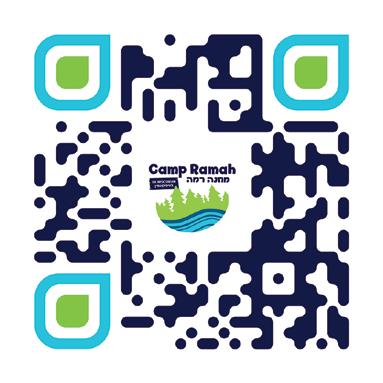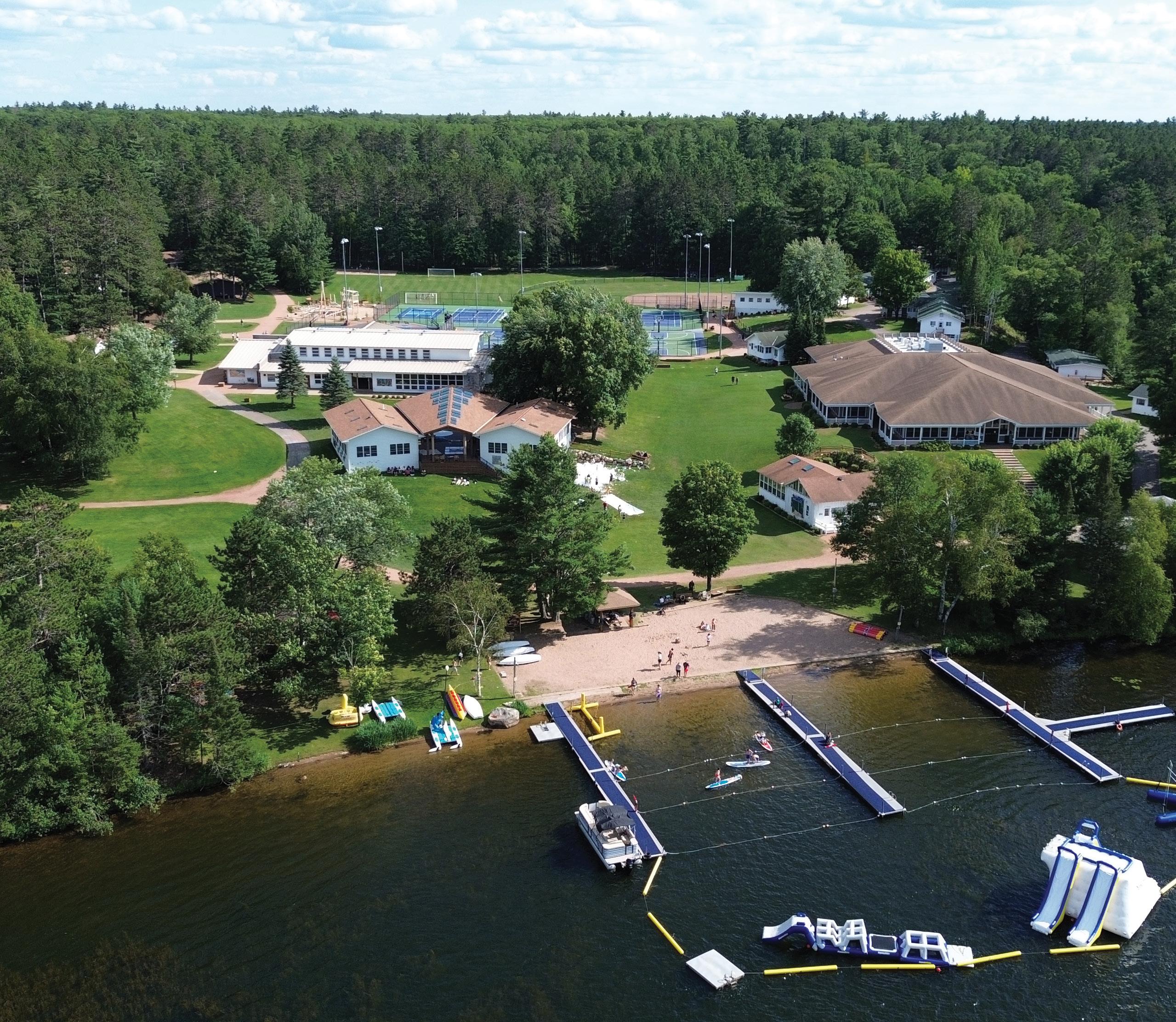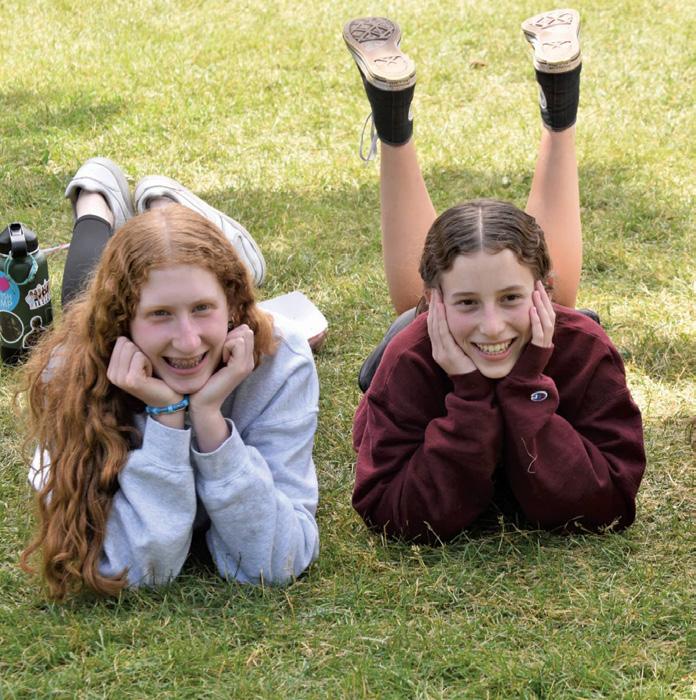What’s Up at Camp Ramah?
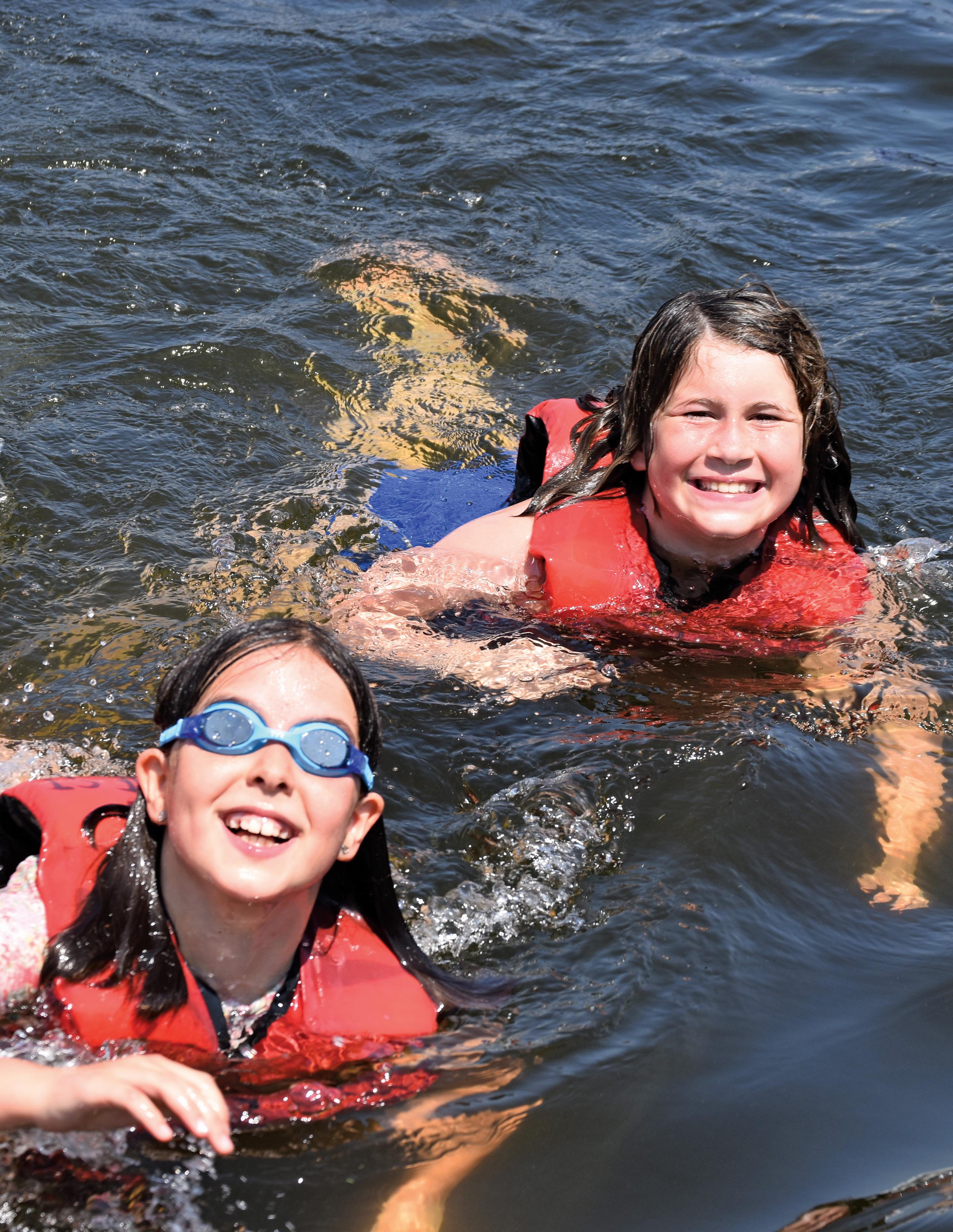
GUIDE FOR NEW CAMPERS & FAMILIES
• ACTIVITIES & SCHEDULES
• PACKING LIST
• TIPS, ADVICE & MORE!
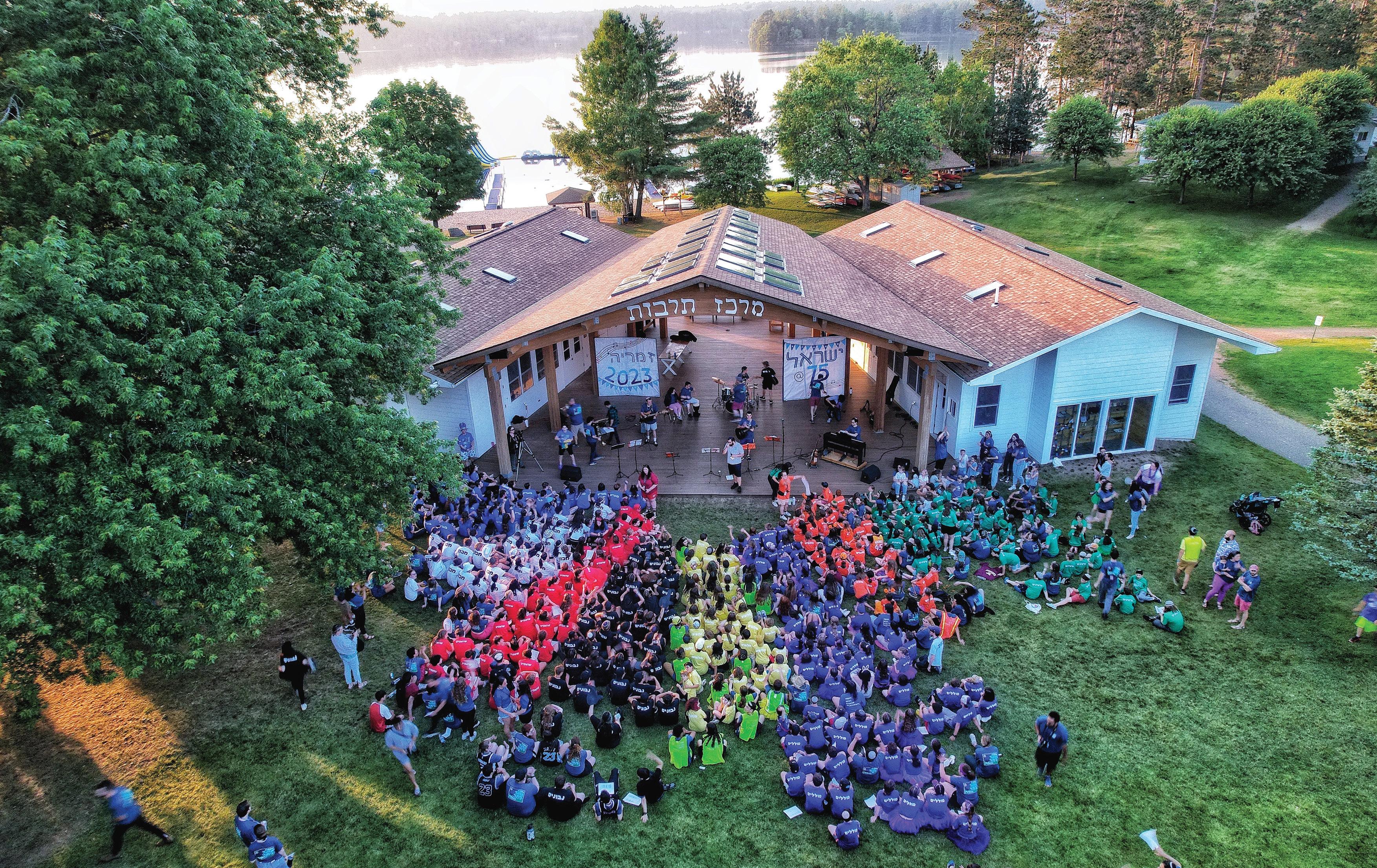

What’s Up at Camp Ramah?

GUIDE FOR NEW CAMPERS & FAMILIES
• ACTIVITIES & SCHEDULES
• PACKING LIST
• TIPS, ADVICE & MORE!

We are excited to welcome you to the Camp Ramah in Wisconsin family this summer. We are fully committed to providing a safe, supportive and fun environment for all of our campers! Camp is a warm and welcoming community where children and teens make amazing friends, learn new skills, increase self-esteem — all in a joyful Jewish environment.
What makes Ramah special in the eyes of parents is the vibrant Jewish experience combined with the professionalism of our staff and our focus on camper care. Our professional team makes time before the summer to speak with new campers, in order to best prepare to meet the needs of each and every child.
We also have a team of adult, camper care professionals and inclusion specialists who work with our counselors, campers and camper families to meet the specific needs of the children in our care and to provide them with the best possible immersive summer experience.
We welcome you to the Ramah Wisconsin family and look forward to partnering in the important work of building Jewish lives.
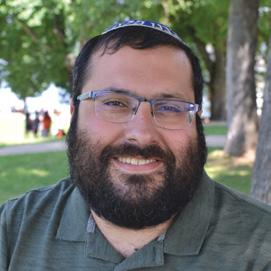 Jacob Cytryn
Adina Beiner Executive Director Assistant Director
Jacob Cytryn
Adina Beiner Executive Director Assistant Director
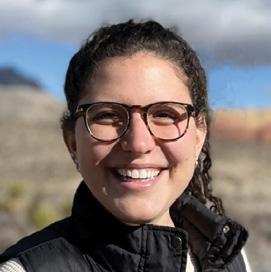
The National Ramah Commission acknowledges with thanks the generous support of the Zell Family Foundation in making the Open Door program possible.
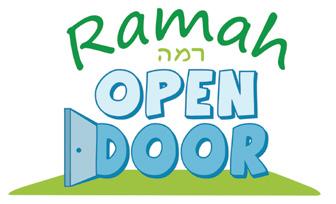 Inspired by Camp Ramah in California
Inspired by Camp Ramah in California
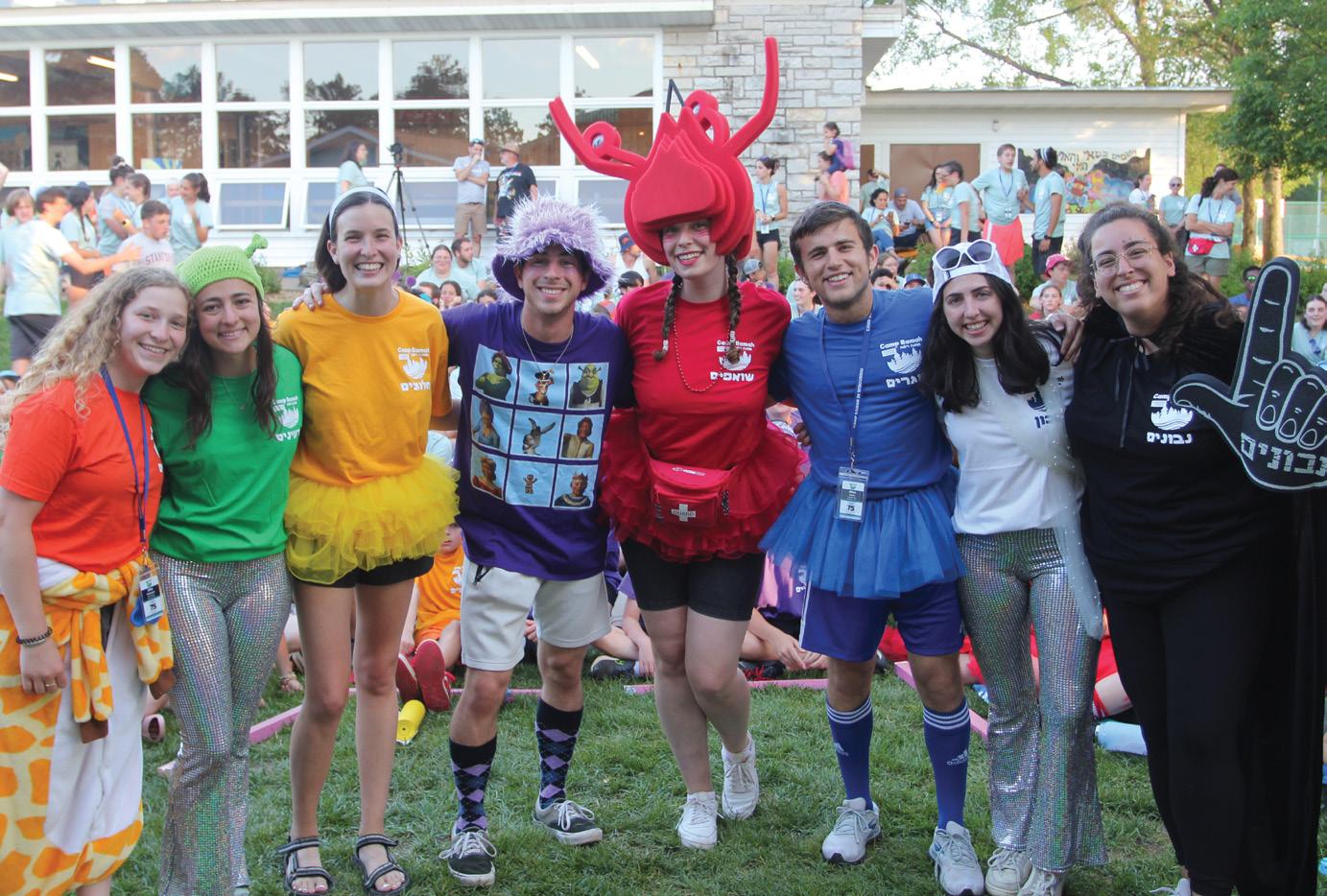
Executive Director – Jacob Cytryn
Assistant Director – Adina Beiner Director of Camp Wellness and Inclusion – Dr. Audra Kaplan
Parents are our partners. We welcome you to be in touch if you receive a letter with concerning information. We may turn to you for helpful strategies if your child experiences challenges.
Division Heads (Rashei Eidah) Counselors (Madrichim/Madrichot)
• Write letters frequently and keep them light and upbeat. Emailing your child through your CampMinder account or the Campanion app is also a great option.
• Be matter-of-fact about your day. Kids like to know what you are doing but not that you are having a lot of fun without them!
• Add as much humor as you can.
• Try not to emphasize how much you miss them.
• If you have concerns about your camper, contact Robin Rubenstein, Family Engagement Director, by email at rrubenstein@ramahwisconsin.com and she will get back to you as soon as possible. Family Engagement Director Robin Rubenstein
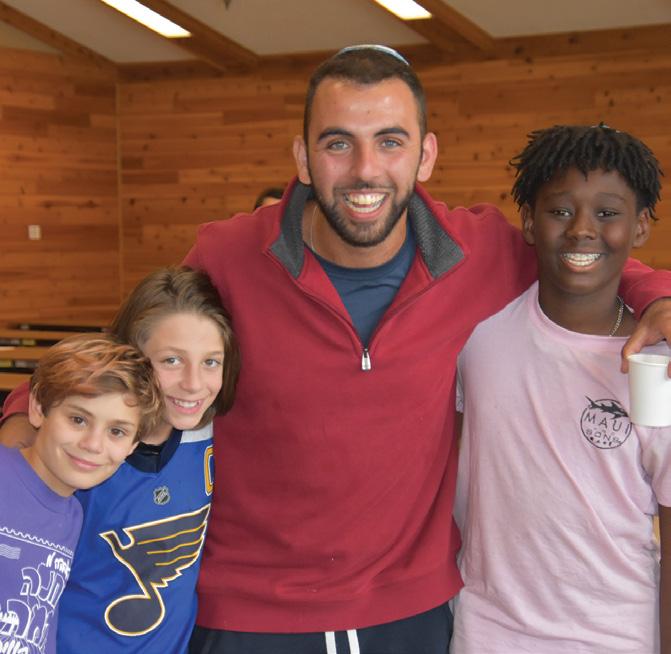

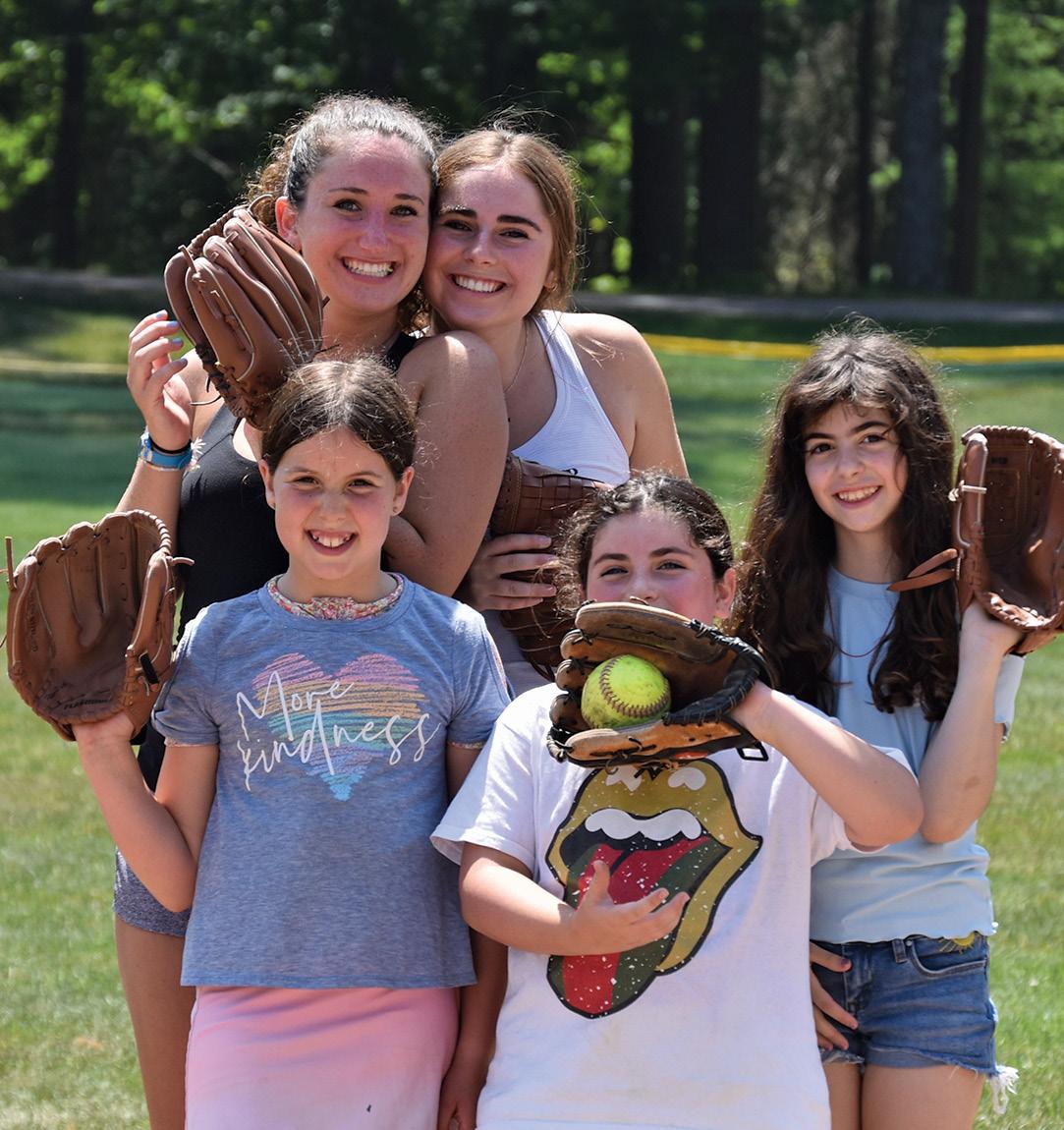
• Basketball, tennis, softball, volleyball, fitness, soccer, gaga, Frisbee, floor hockey, archery, judo, yoga, Ninja warrior obstacle course, and pickleball
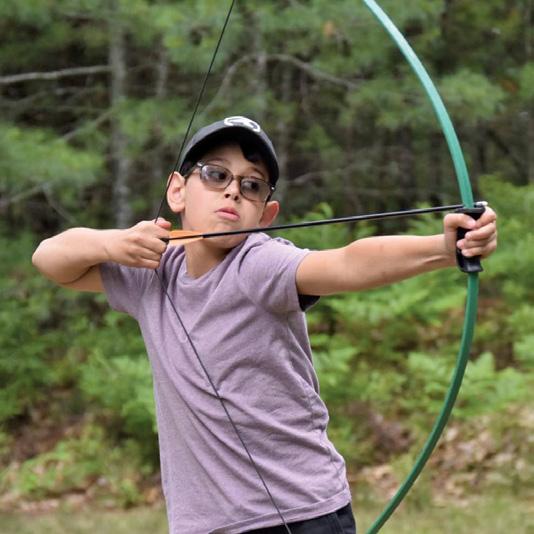
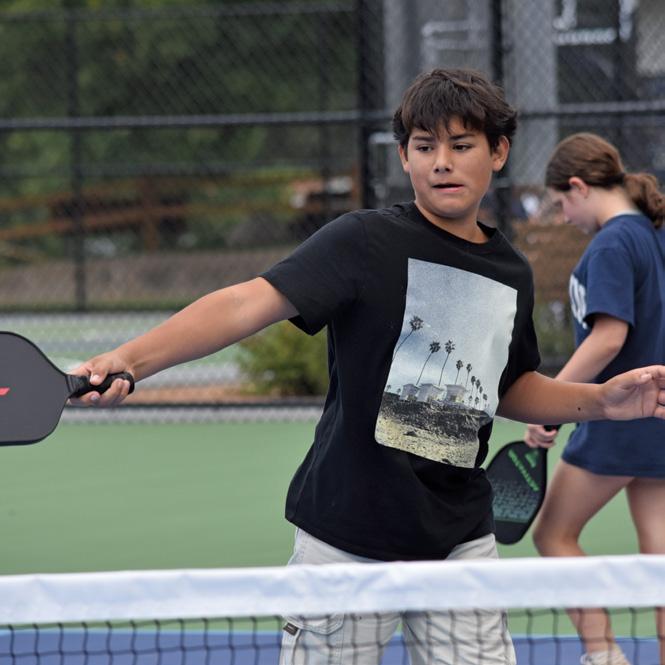
• Drama – Acting, improvisation, scenery and costume making
• Dance – Creative, modern, Israeli folk dancing, hip-hop, ballet and musical theatre
• Music – Choir, band, instrumental instruction and performance including guitar, piano and drums, ukulele and traditional band and orchestra instruments
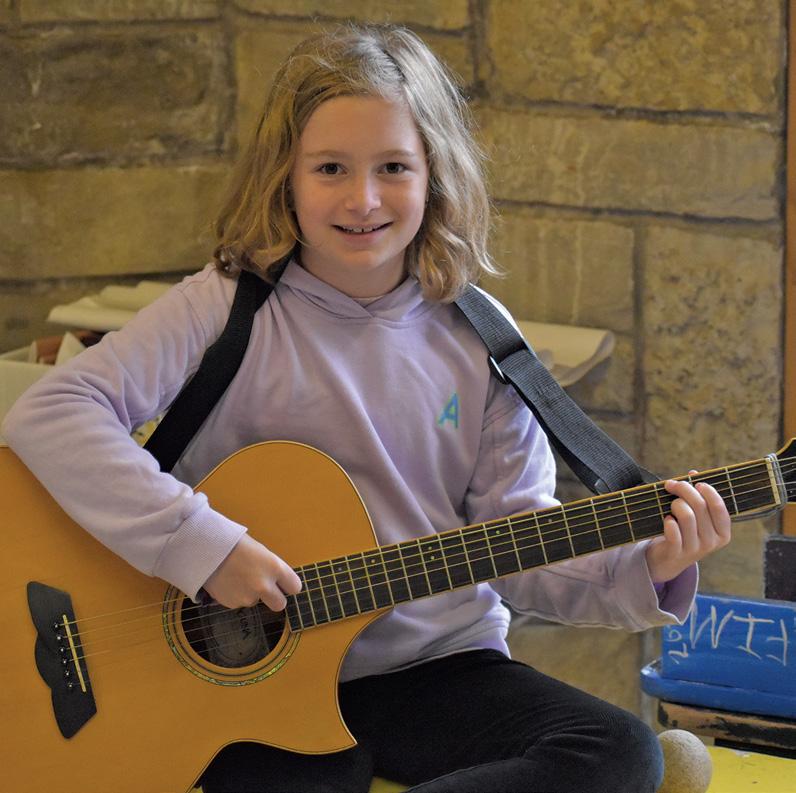
• Campers prepare recipes from around the Jewish world in our state-of-the-art teaching kitchen

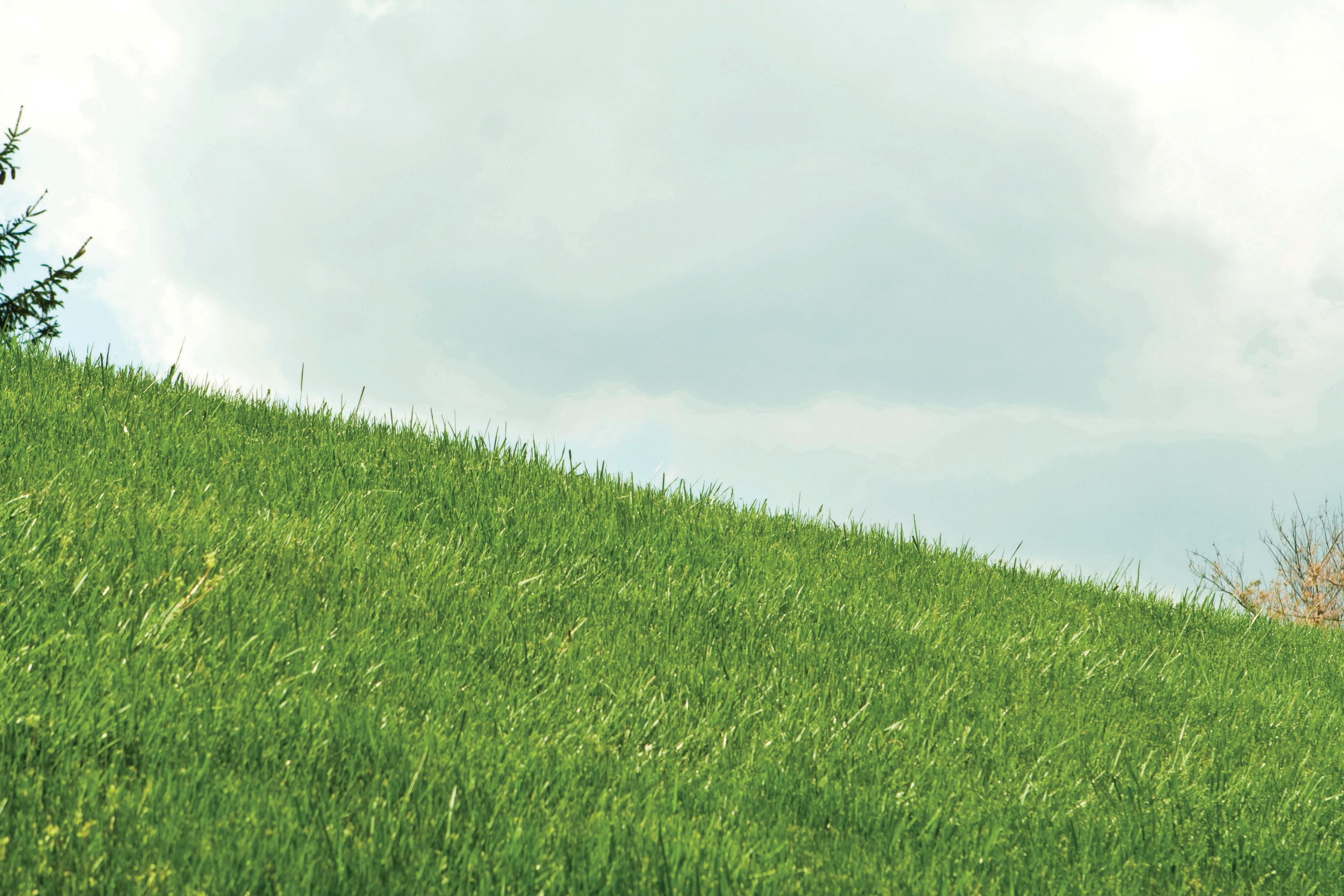
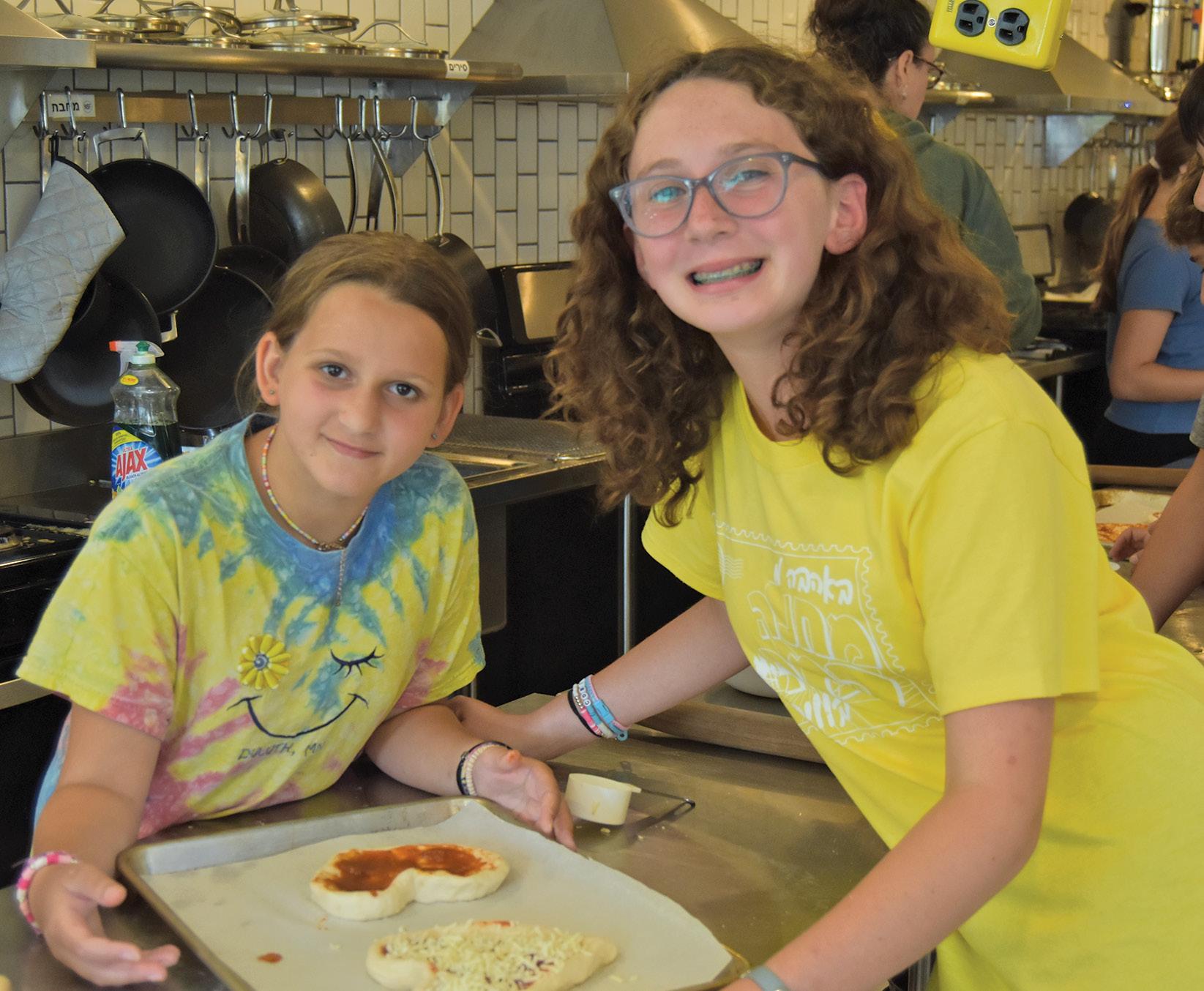
designed to teach new skills, build abilities and increase self-esteem!
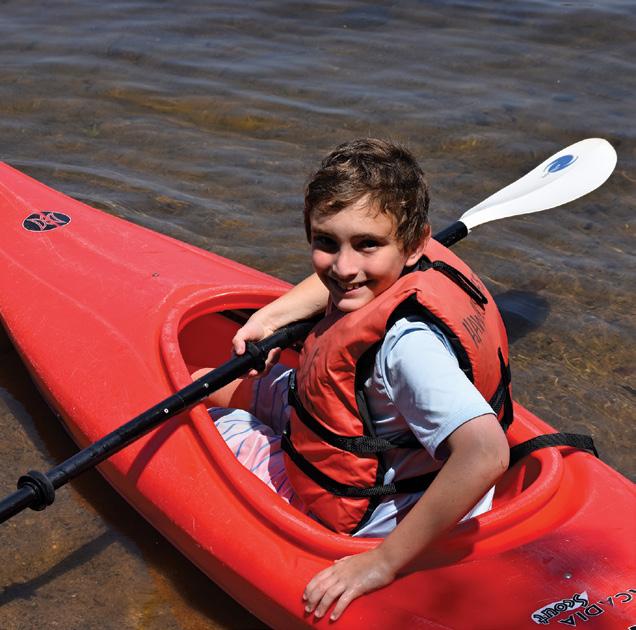
• Swim instruction program, standup paddle boards, Aqua Glide obstacle challenge track, water basketball, log rolling, lifeguard training (10th graders), rowing, canoeing, sailing, kayaking, paddle boats, and tubing
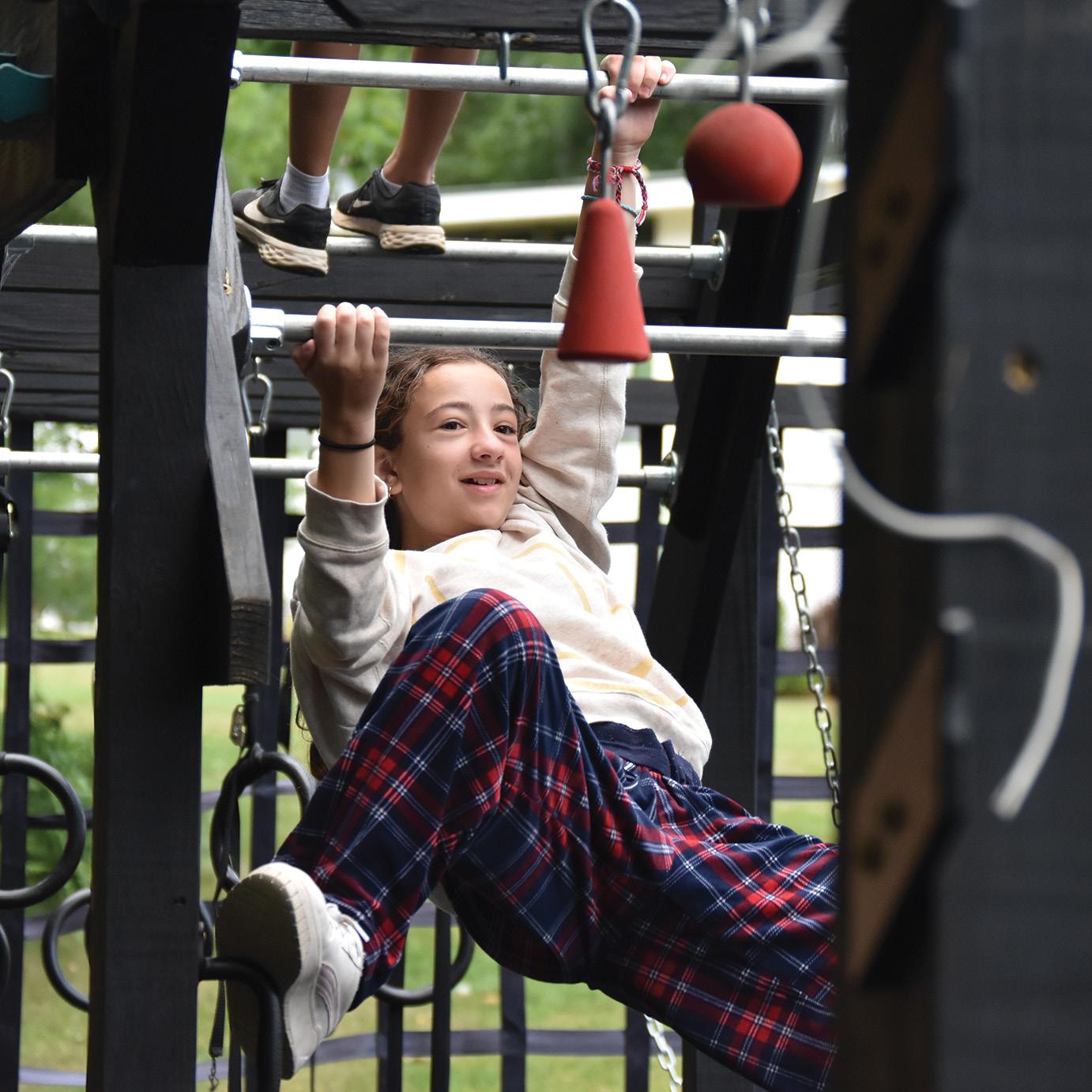
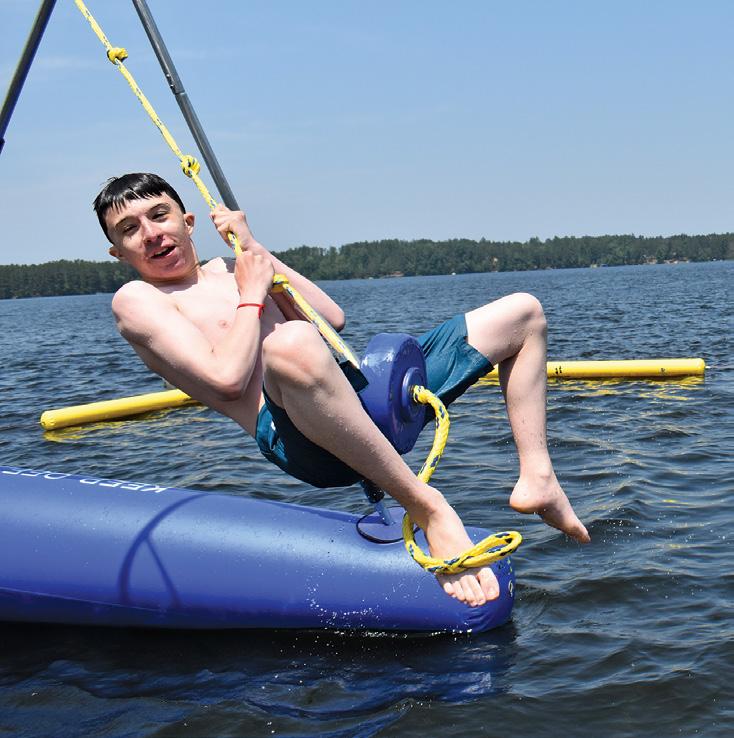
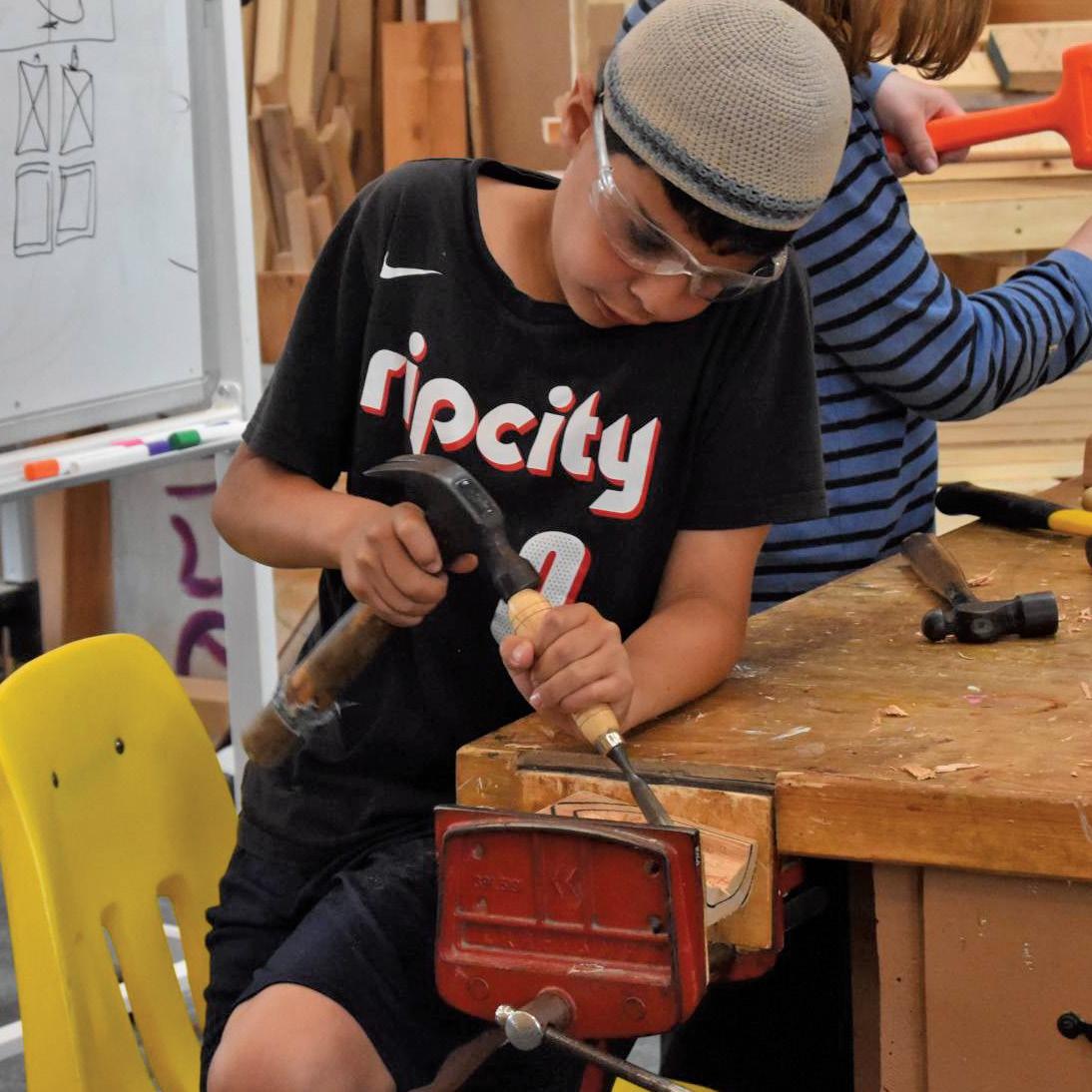
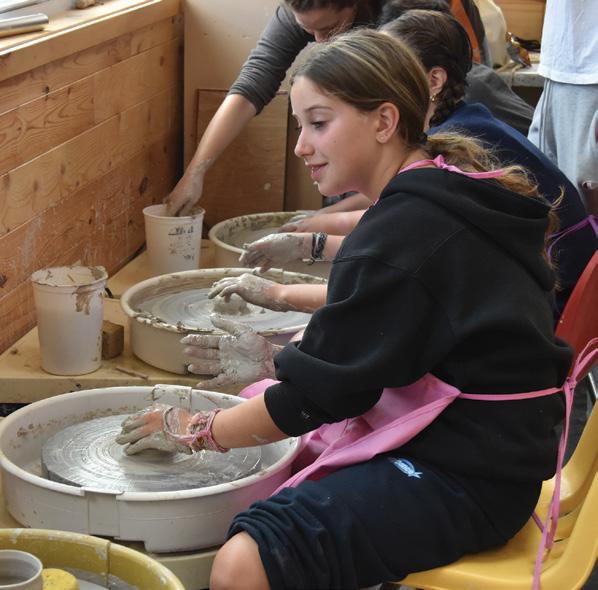


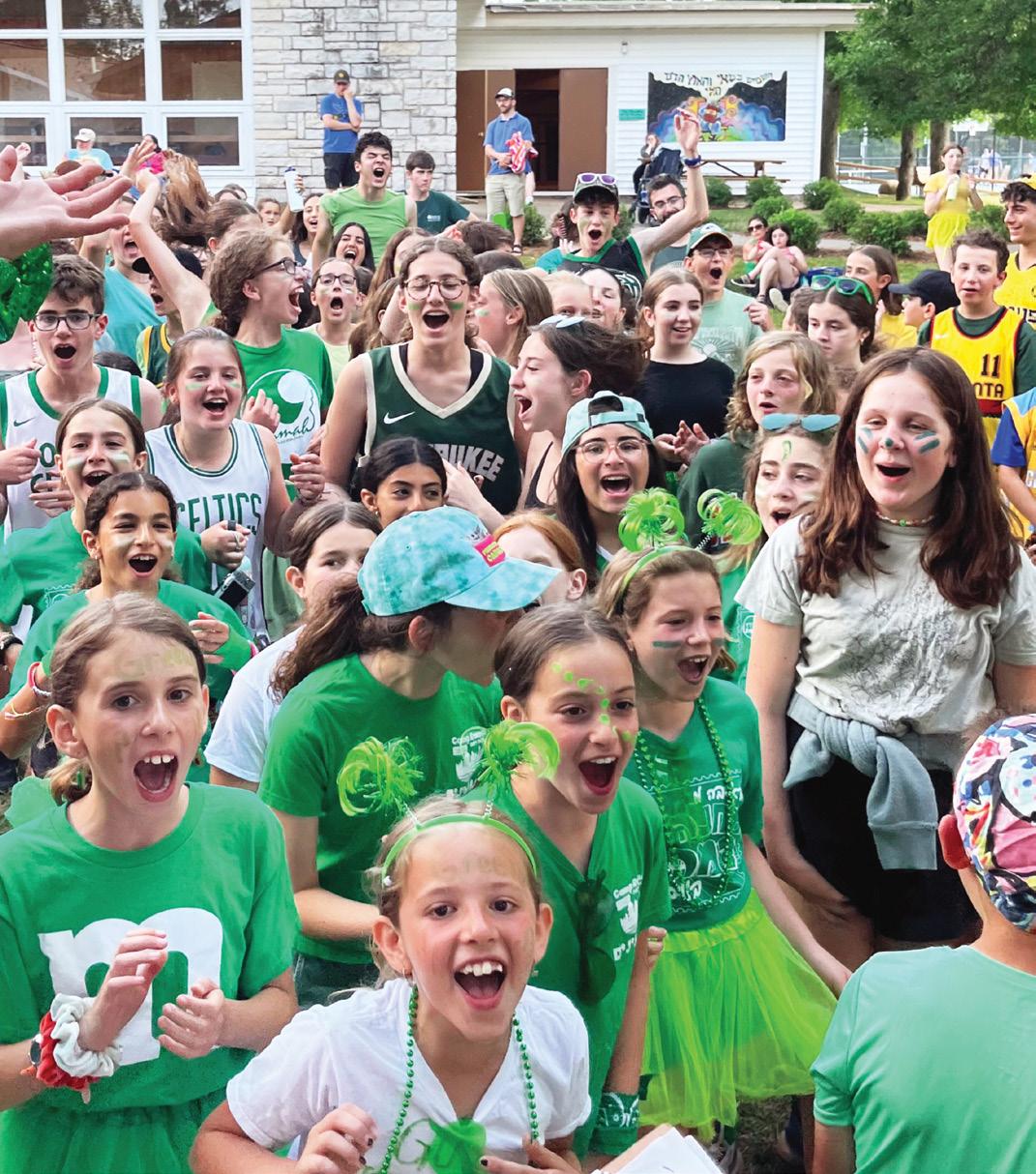
Our exciting song festival opens the camp season with an evening of music and celebration.
Each age group enters one act into this silly event in which campers perfect their costumes, choreography and lip syncing skills to win over the judges.
Campers of all ages are divided into four teams for a day full of excitement and fun competition.

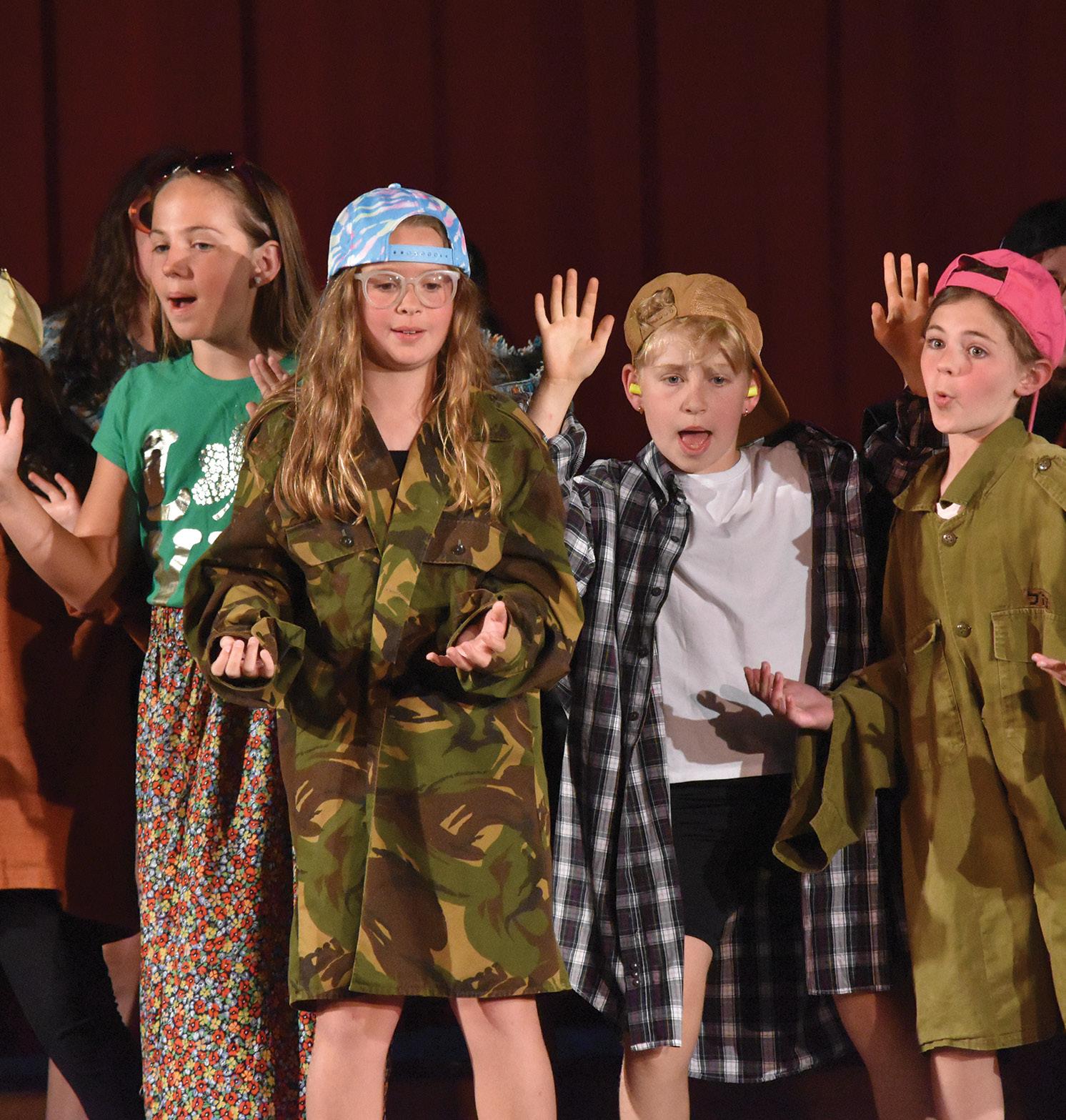


Campers enjoy American line dancing, foam parties, and tons of fun on Independence Day!
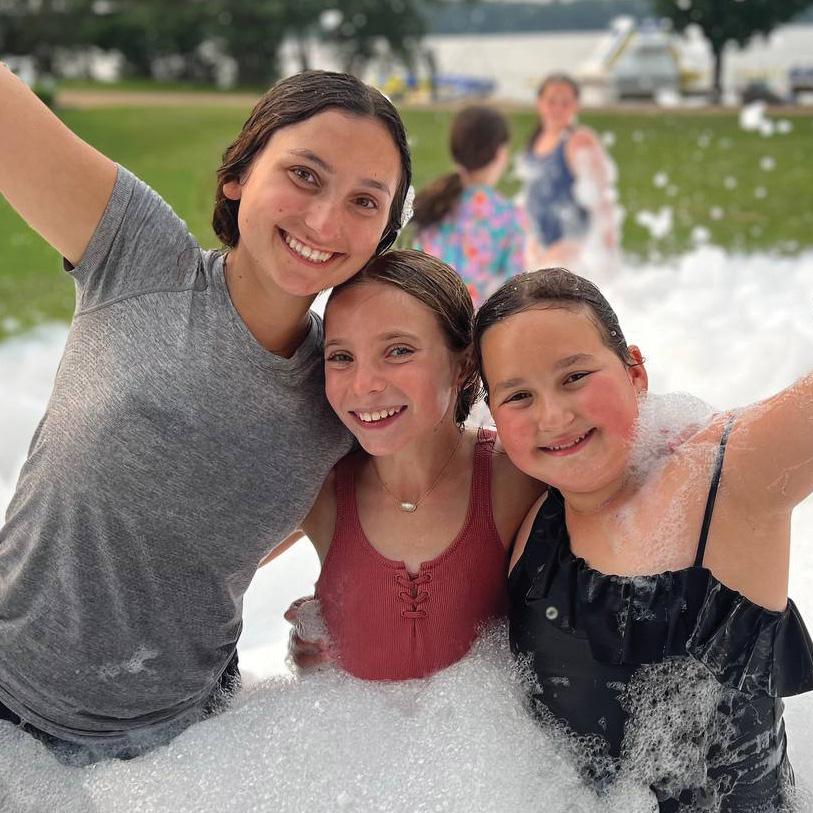
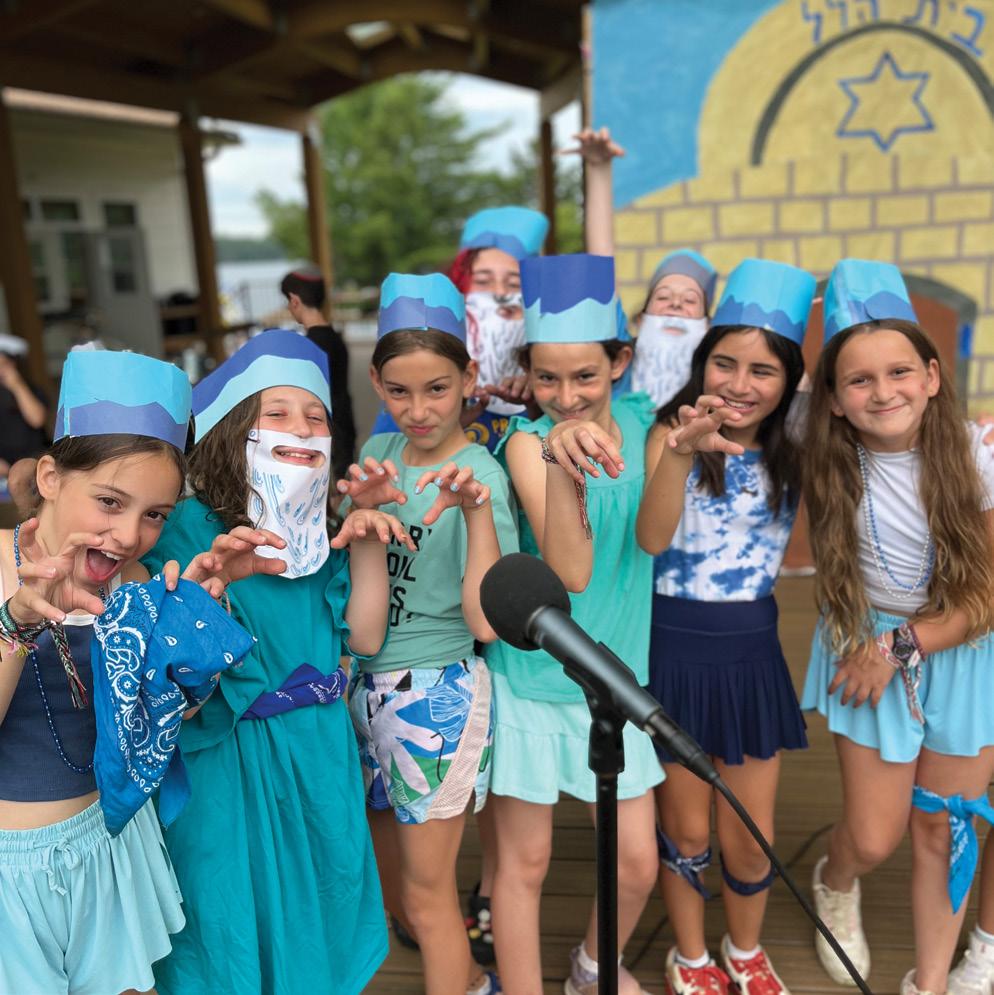
Everyone comes together to enjoy campers sharing
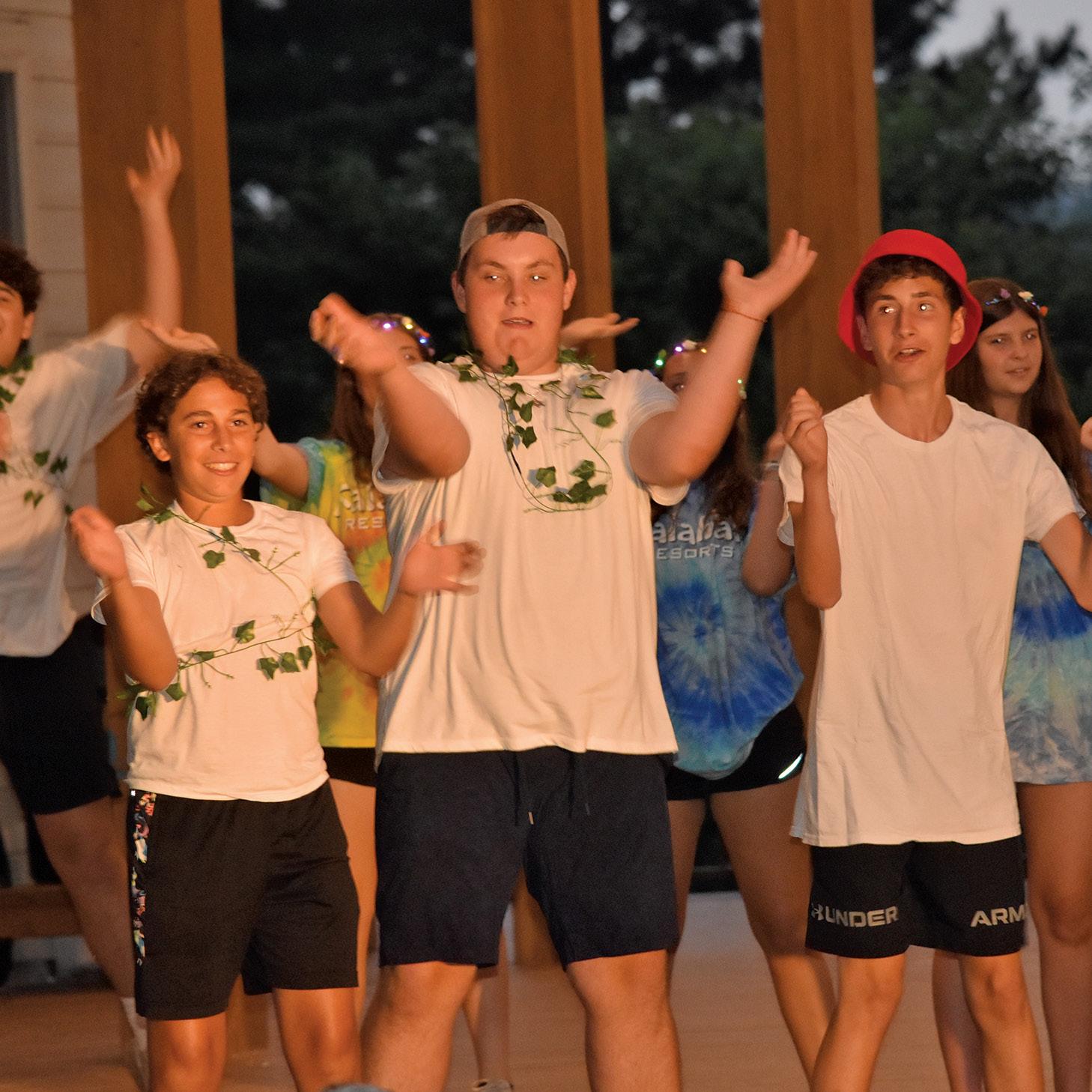


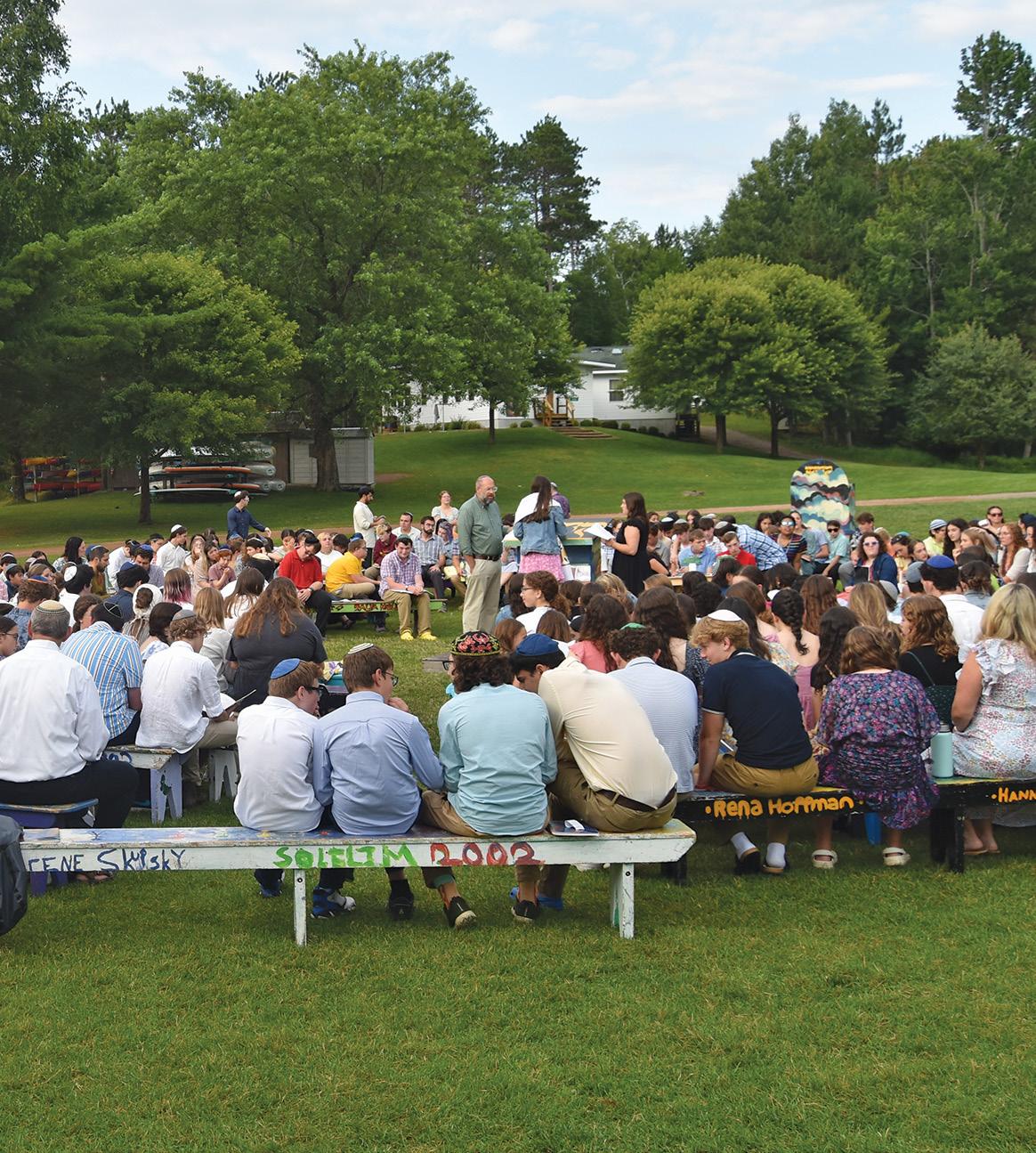
Shabbat begins with the entire camp gathering by the lake on Friday evening and ends with Havdalah on Saturday night. In between there are opportunities for sports and swimming, relaxation, and quality time with friends.
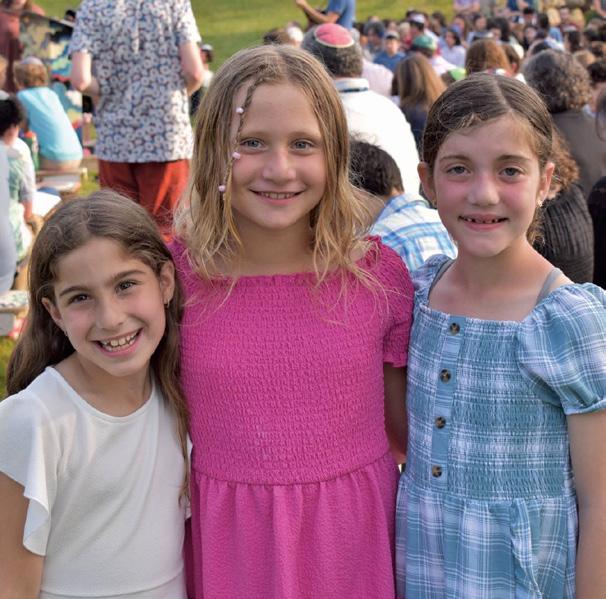

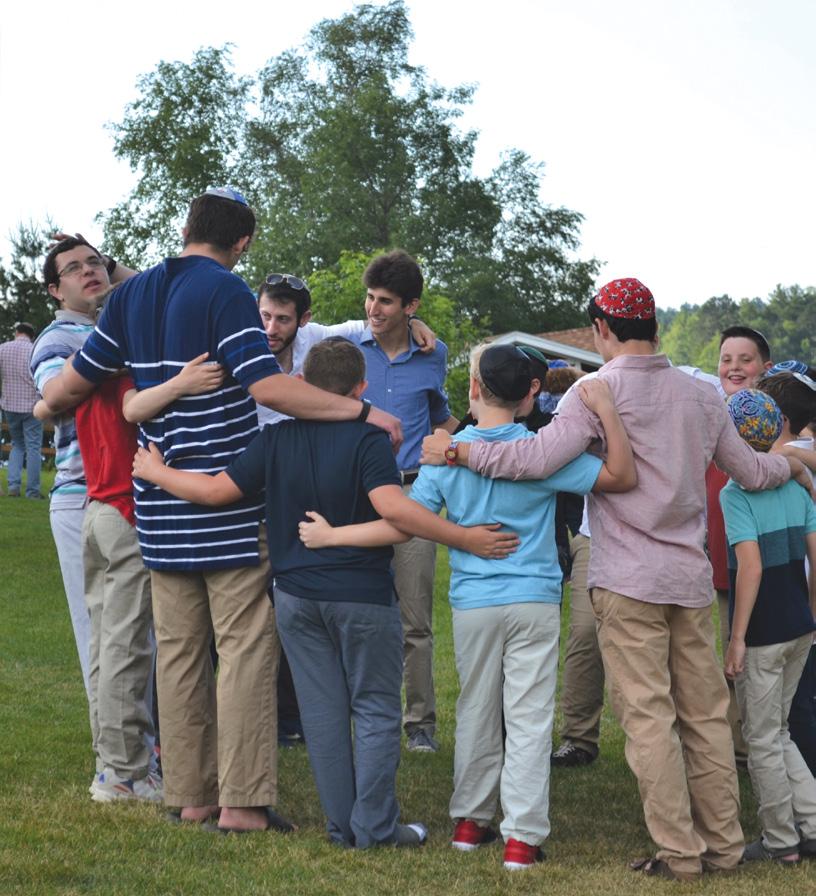


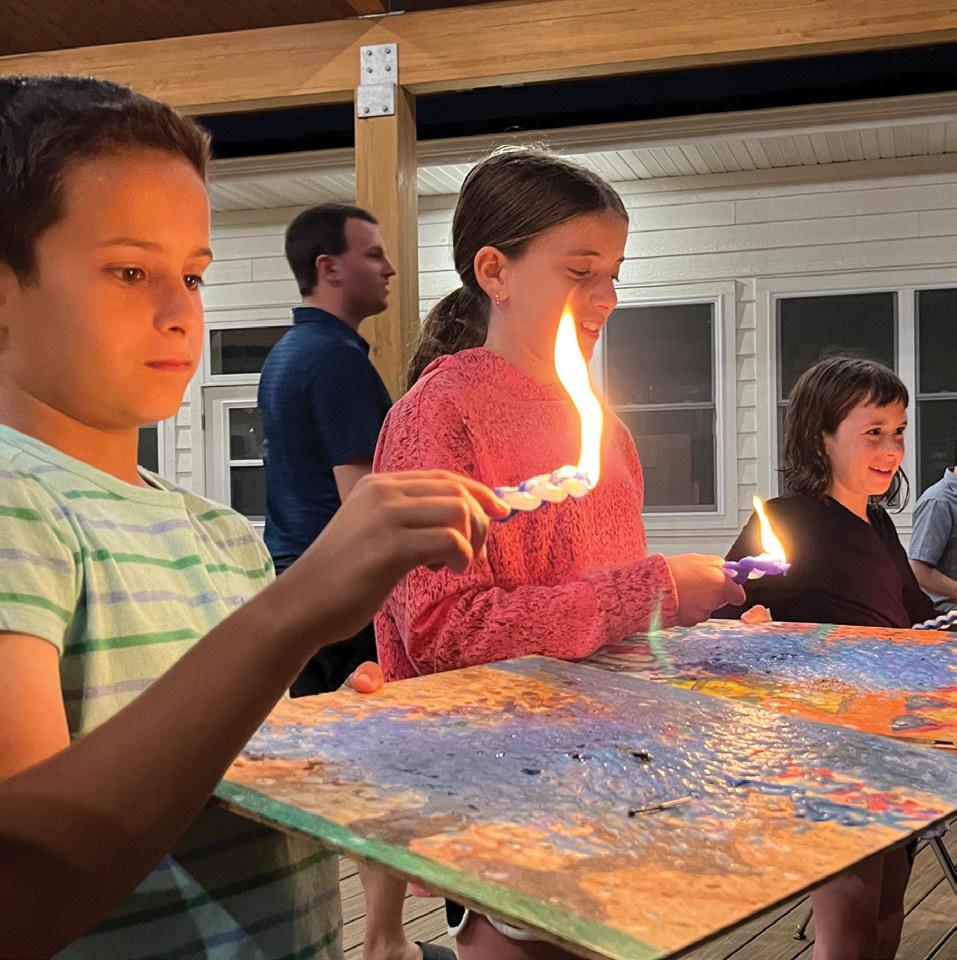
Sample Daily Schedule
(entering 4 th -6 th grades)
7:30AM המיק Kima (Wake Up)
8:00AM רקוב תחורא Aruchat Boker (Breakfast)
8:45AM הליפת Tefillah (Prayer)
9:30AM ןויקנ Nikayon (Cabin Clean Up)
10:15AM םיגוח Chugim (Electives)
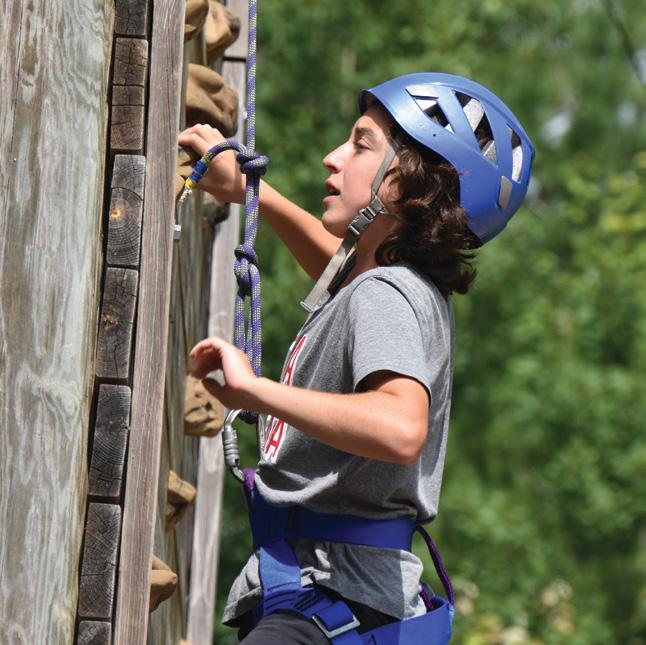
11:15AM םגא Agam (Lake Fun + Swimming)
12:00PM ףיטח Hatif (Snack)
12:15PM לארשי תוברת/תודהי (Jewish/Israel Activities)
1:15PM םיירהצ תחורא Aruchat Tzharayim (Lunch)
2:00PM החונמ תﬠש Sha’at Menucha (Rest Hour)
3:00PM םיגוח Chugim (Electives)
4:00PM הדיע תלועפ Peulat Eidah (Eidah Activity)
5:00PM םיגוח Chugim (Electives)
6:00PM ףירצ תלועפ Peulat Tzrif (Cabin Activity)
7:00PM ברﬠ תחורא Aruchat Erev (Dinner)
7:45PM ברﬠ תלועפ Peulat Erev (Evening Activity)
8:30PM בוט הליל Laila Tov! (Goodnight!)
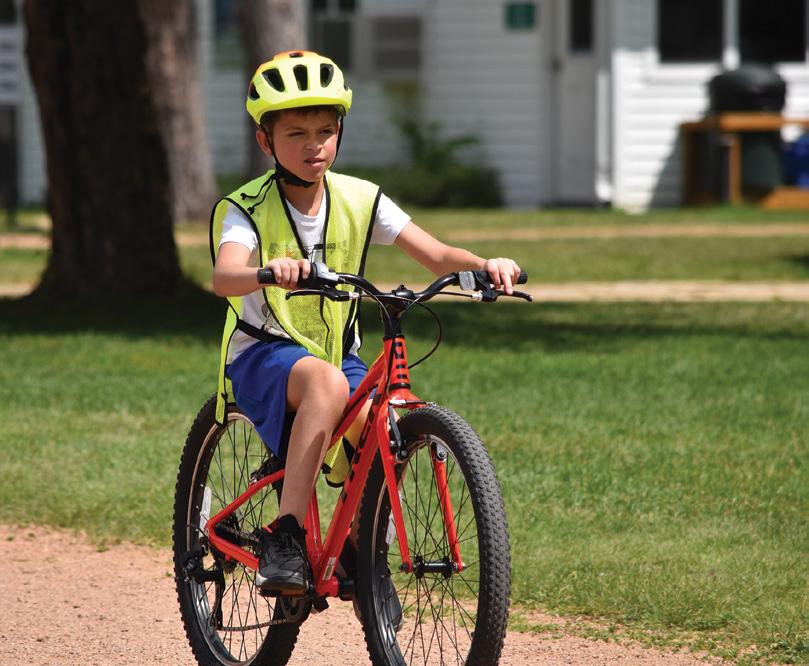
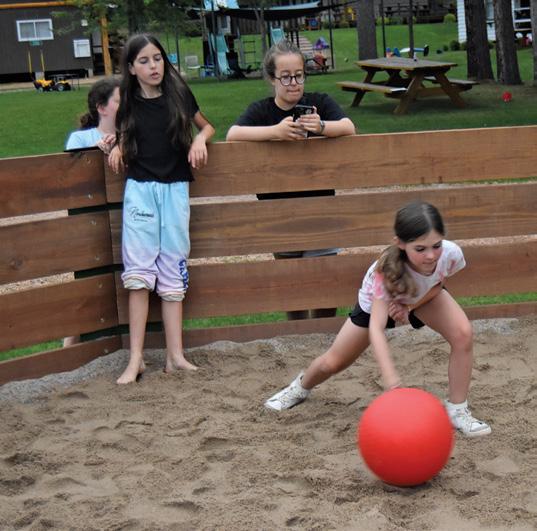
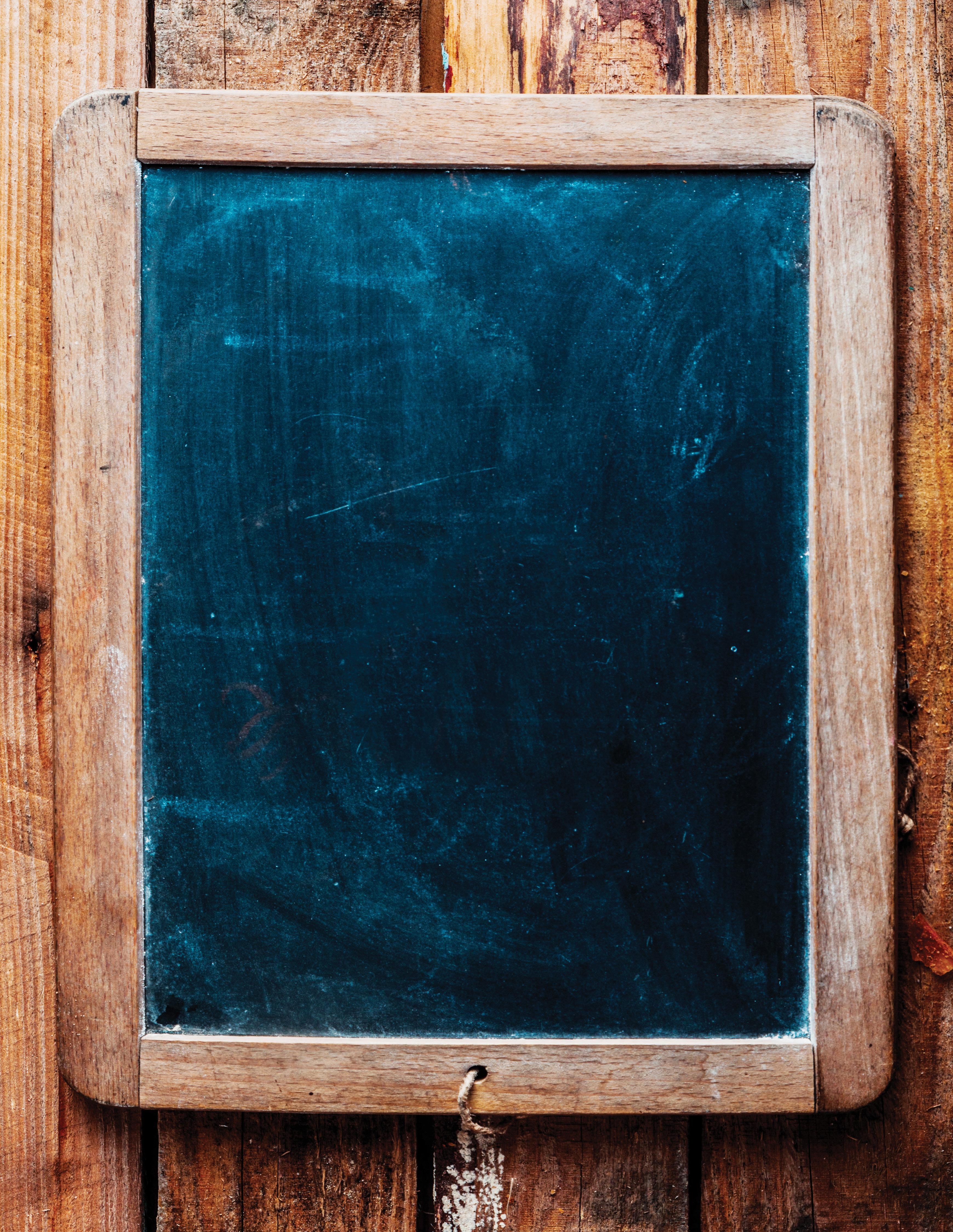
Sample Daily Schedule (entering 7 th -10 th grades)
7:30AM המיק Kima (Wake Up)
8:00AM הוליפת Tefillah (Prayer)
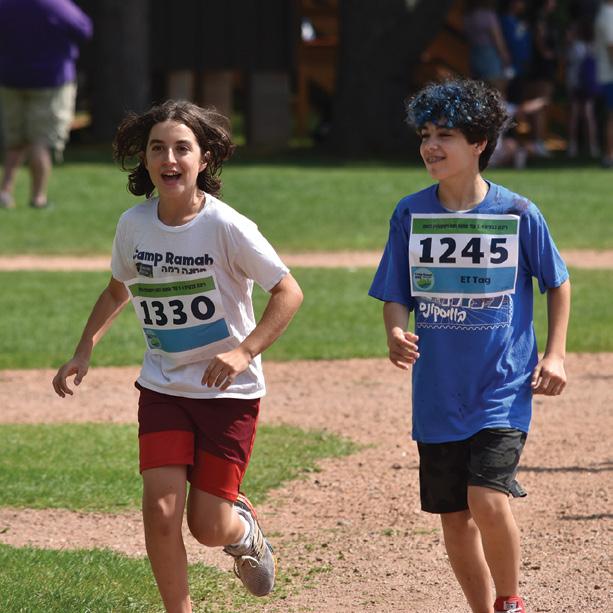
9:00AM רקוב תחורא Aruchat Boker (Breakfast)
9:45AM ןויקנ Nikayon (Cabin Clean Up)
10:15AM לארשי תוברת (Israel Activities)
11:15AM םיגוח Chugim (Electives)
12:00PM ףיטח Hatif (Snack)
12:15PM םגא Agam (Lake Fun + Swimming)
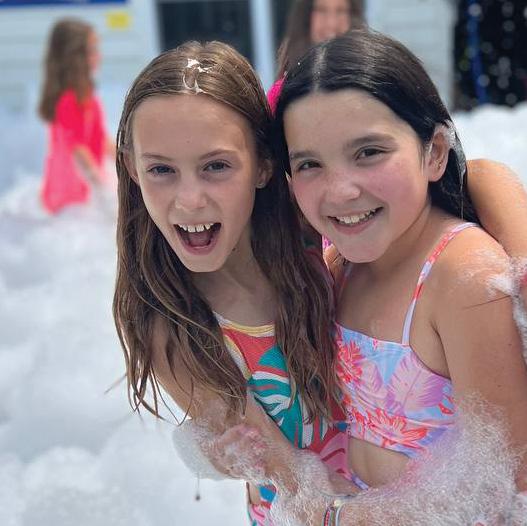

1:15PM םיירהצ תחורא Aruchat Tzharayim (Lunch)
2:00PM החונמ תﬠש Sha’at Menucha (Rest Hour)
3:00PM רמזחמ Mahazemer (Musical Rehearsal)
4:00PM תודהי Yahadut (Jewish Content)
5:00PM םיגוח Chugim (Electives)
6:00PM ישפח ןמז Zman Hofshi (Free Time)
7:00PM ברﬠ תחורא Aruchat Erev (Dinner)
7:45PM ישפח ןמז Zman Hofshi (Free Time)
8:30PM ברﬠ תלועפ Peulat Erev (Evening Activity)
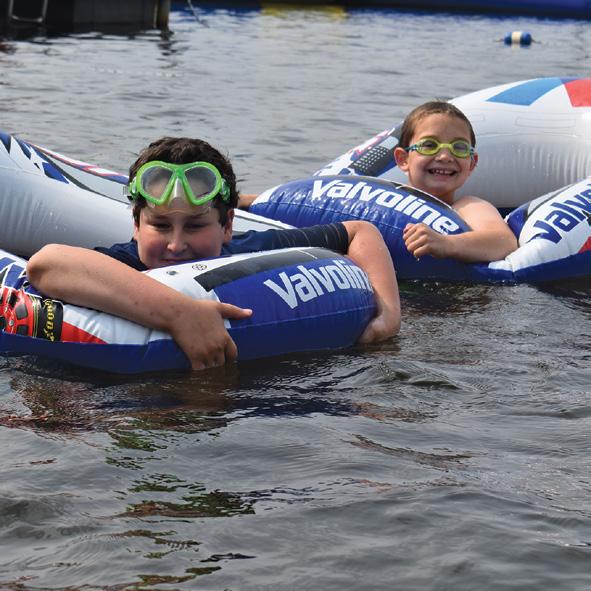
Clothing
12 underwear
12-15 socks
4 -6 bras: regular, sport (if applicable)
10-12 t-shirts (+1 white one for decorating)
4 long sleeve shirts
5 sweaters/sweatshirts
(mix of lightweight and heavyweight)
8-10 shorts
6 pants (joggers, leggings, jeans, etc)
3 pajamas (1 warm)
3 modest swimsuits
Toiletries
Toothbrush (in container) and toothpaste
Brush/comb and hair accessories (hair ties, hair bands, etc)
Shampoo, conditioner
Soap (in container) or face/body wash and loofah
Portable shower caddy (with holes for storage/transport)
Deodorant
Sunscreen
Insect repellant, insect bite pain relief treatment
Menstrual supplies (if applicable)
Razor (if applicable)
Orthodontic retainer (if applicable)
Outerwear & Footwear
3 hats (2 baseball caps, 1 winter beanie)
1 durable raincoat
1 fall jacket (warm)
1 pair rainboots or water-resistant shoes
1 pair athletic shoes (for sports)
1 pair sturdy walking shoes (think ropes course!)
1 pair flip flops or shower shoes
Shabbat Clothing
3- 4 outfits
1 pair shoes
Shabbat adds an additional level of holiness to our community. Modest, nicer-than-everyday clothing is appropriate dress for Shabbat. We recommend button-down shirts, blouses, sweaters, skirts, slacks or dresses/rompers for Friday night. Many campers and staff choose to change into more casual clothing for Shabbat morning services.
Scan the code for 1-week & 2-week packing lists!
Linens & Towels
1 pillow
2 pillow cases
2 fitted sheets
2 flat sheets or duvet covers
2 blankets
Towels (4 -6 shower, 2-3 beach)
4 washcloths
Sleeping bag
Optional: mattress pad
Other necessary items
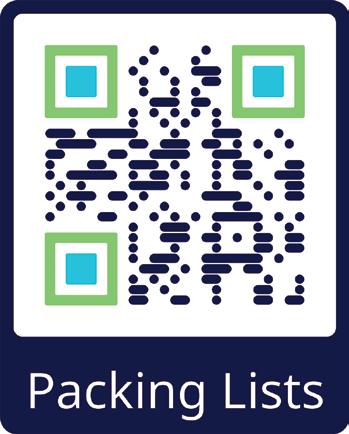
5 kippot and clips (required for boys, encouraged for girls)
Tallit and tefillin (for b’nai mitzvah)
Watch (inexpensive, non-smart watch)
Flashlight and batteries
Glasses or Contacts, plus solution and an extra pair (if applicable)
Pens, stationary, stamps (pre-addressed, pre-stamped envelopes recommended)
2 water bottles
1 hanging shoe bag (to keep shoes off the floor and store other small items)
2 laundry bags
Other optional items
Sunglasses
Bathrobe
Slippers
Lip balm
Nail clippers, nail file
Small fan
Camera
Sports equipment (baseball glove, swim goggles, tennis/pickleball racket)
Musical instrument and music
Simple costumes for Yom Sport or eidah (bandana, tutu, wrist band, etc)
Books, games (card, board)
Comfort items to make your bed/space feel like home (Pictures of loved ones, special pillow, fairy lights, etc)
Remember, you know your child best! This is a suggested list for what campers might need. Plan on needing about 10 days’ worth of clothes.


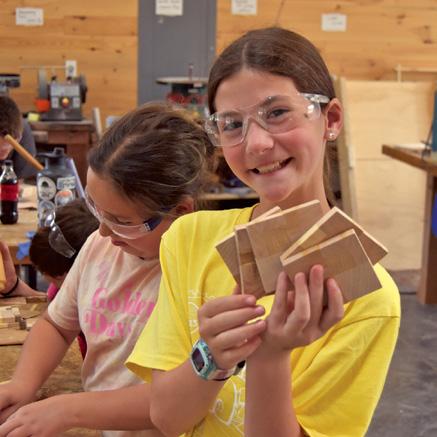
Do I pack my child’s favorite t-shirt? What if it gets lost? Should I send up enough pairs of socks for one per day or more? What’s the best way to label clothing? These may be a few of the questions going through your mind as you begin the packing process. Below are a few tips offered by veteran camp parents who have perfected the art of packing for camp. And yes, it is most certainly an art!
• Pack WITH your child, not at night after they are fast asleep. You may be surprised about what clothing items your child doesn’t want to leave home without. More importantly this helps familiarize them with what is in their luggage so that upon arrival at camp when they begin the unpacking process it’s easy for them to pull out their bedding to make their bed and to locate pajamas and whatever else they may need.
• Provide tools for organization. If you can imagine that your child’s cubby may easily become a black hole of clothing where it could be challenging to find a pair of clean socks, you may want to consider sending up certain items like socks and underwear in mesh laundry bags.
• Ziplock bags are your friend! Use them for the following:
• Underwear – send extra
• Socks – send extra
• Shabbat Outfits
• Shampoo and Conditioner
• Sunscreen
• Pack a waterproof basket for all of your child’s toiletries. Once at camp, the counselors will instruct your child to put their toiletries into this basket, and it will be used daily to help keep your child organized.
• Order sticker nametags in advance and LABEL LABEL LABEL. Use sticker labels or iron-on labels to label everything that you send with your child (including the clothing they wear on the bus). Believe it or not, the stickers stay on even after numerous washings. Please take the time to label everything you are sending up to camp including water bottles, flashlights, even shoes. Labels help bunk clean-up go smoothly and allow us to return items left around camp before the session ends. The good old-fashioned permanent marker method often results in hard-to-read names or only initials, and you’d be surprised how many kids there are up at camp with the same initials!
• Please don’t pack anything valuable or expensive.
If you have any questions or concerns about your camper, please reach out to Family Engagement Director
Robin Rubenstein at rrubenstein@ramahwisconsin.com
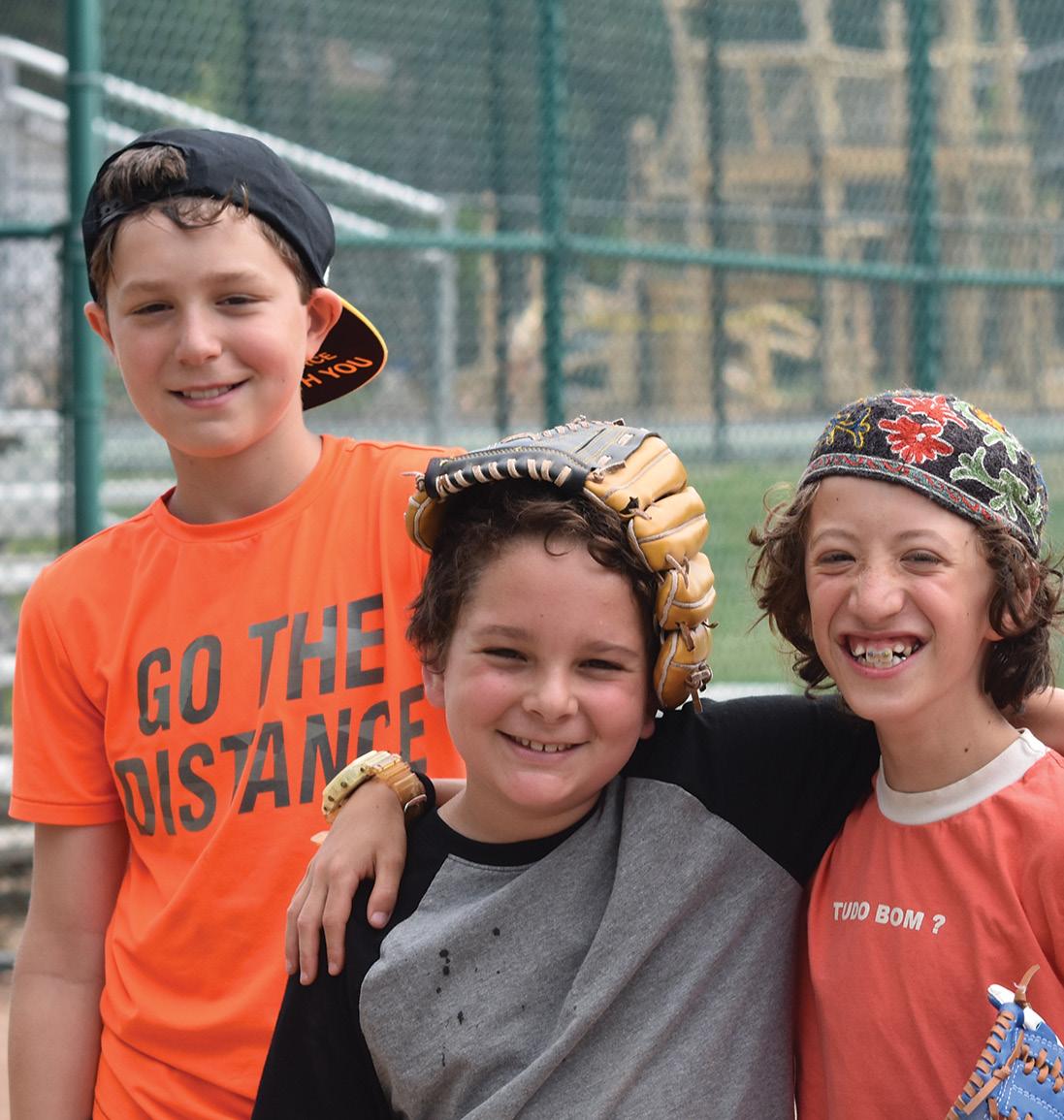
• Help your child set realistic expectations. Remind your child that not every day at home or school is perfect. Likewise, not every day at camp will be perfect, but they can look forward to a lot of fun activities and meeting great new people.
• Consider sending your child with something that helps them to feel safe and familiar at night, like a blanket or stuffed animal.
• If your child is feeling anxious about going off to camp, you can talk about other times that your child experienced anxiety and ended up getting through the situation just fine.
• Discuss strategies with your child if they have a difficult time falling asleep or waking up early (i.e. reading, drawing).
At Ramah our professional chef and culinary team create healthy and tasty meals made from fresh ingredients. All meals are served family style with plenty of gluten-free, dairy-free and vegetarian options.
Sunday
Scrambled Eggs & Hashbrowns
Monday Pancakes
Tuesday Bagels & Hard-boiled Eggs
Wednesday
Cheese Omelet & Hashbrowns
Thursday Waffles
Friday
French Toast Casserole Shabbat
Egg Frittata & Scones
Every Breakfast
• Cereal & Granola
• Greek Yogurt & Cottage Cheese
• Fresh Fruit
• Oatmeal
Every Lunch and Dinner
• Fresh Vegetables and Salad Offerings
• Protein Topping Including: Tuna, Chickpeas & Beans
• Soup and/or Roasted Vegetables
• Peanut Butter & Jelly
Sunday
Grilled Cheese & Tomato Soup
Monday
Chicken Nuggets & Mashed Potatoes
Tuesday
Vegetarian Tacos
Wednesday
Make Your Own Sandwich & Salad Bar
Thursday
Meatball Hoagies with French Fries
Friday
Pizza with Carrots & Celery
Shabbat
BBQ Pulled Chicken, Deli Sandwiches & Cholent
Sunday
Israeli Theme Night: Chicken
Shwarma, Israeli Salad & Pita
Monday
Salmon, Kale & Roasted Potatoes
Tuesday
Panko Baked Chicken, Mashed Potatoes & Broccoli
Wednesday
BBQ (Hamburgers, Hotdogs, Baked Beans & Watermelon)
Thursday
Vegetarian Lo Mein, Egg Rolls & Mixed Vegetables
Shabbat
Challah, Chicken Soup, Brisket, Potatoes, Glazed Carrots & Cake
Saturday
Baked Ziti & Breadsticks
• Kosher – All food is certified kosher, the kitchen is supervised at all times (mashgiach t’midi), and we operate under the Rabbinic auspices of Rabbi Joel Roth of the Jewish Theological Seminary
• Vegetarian – When we serve meat or fish there is always a vegetarian option.
• Gluten-Free – While our kitchen is not gluten-free, there is a selection of glutenfree products offered at meals.
• Dairy-Free/Vegan – At every meal we strive to serve a dairy-free (usually vegan) option as well as offering soy milk and lactaid milk at breakfast.
• Daily Snacks – We provide a mid-morning and mid-afternoon healthy snack. Options include: popcorn, granola bars, apple sauce and ice pops.
• Nuts – There are no nuts used in our cooking, however we do make peanut butter available at all meals. We serve products that are made in a facility that also processes nuts.
• Fresh Fruit – A variety of fresh fruit including apples, pears, plums, peaches, and nectarines is available 24/7.
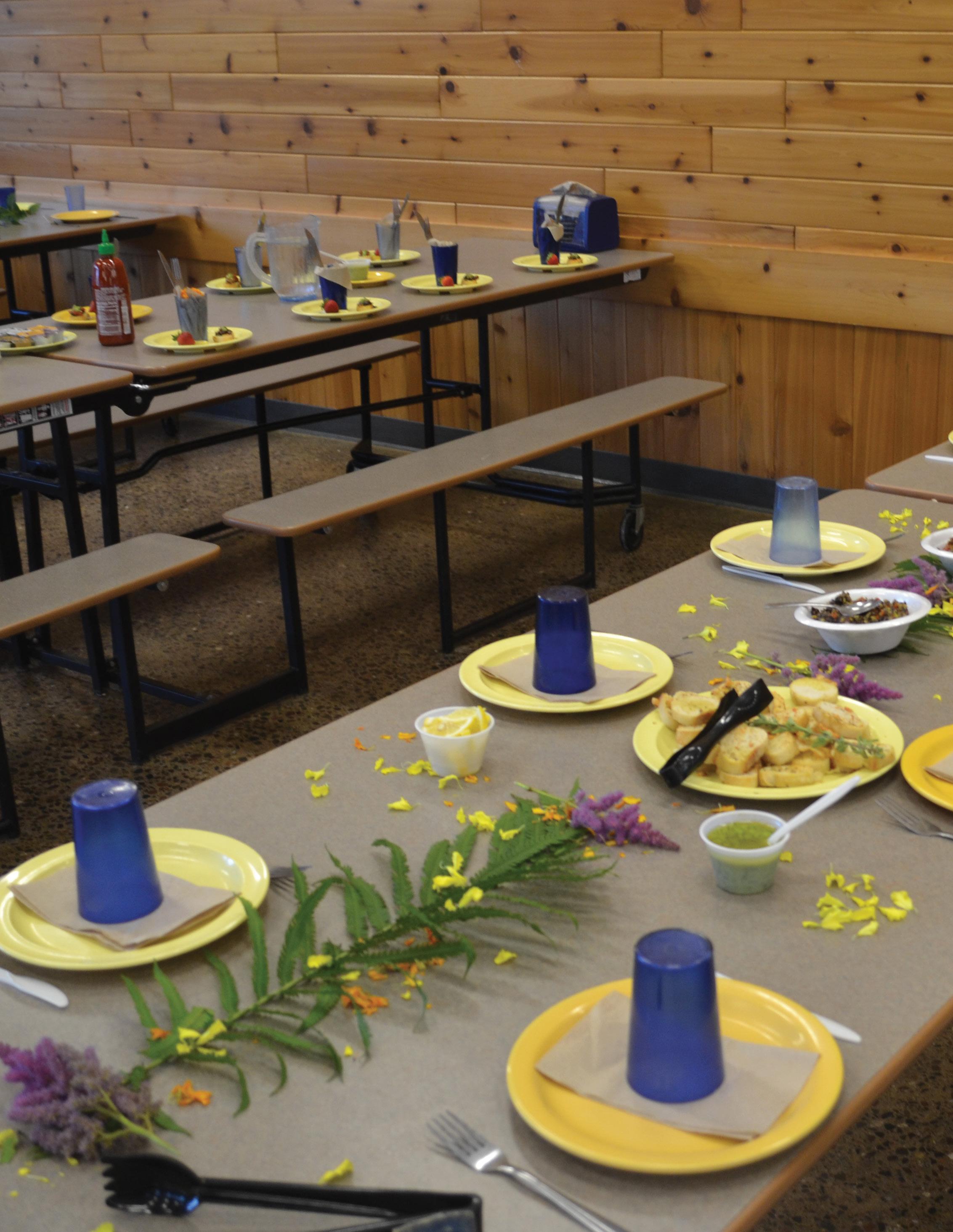
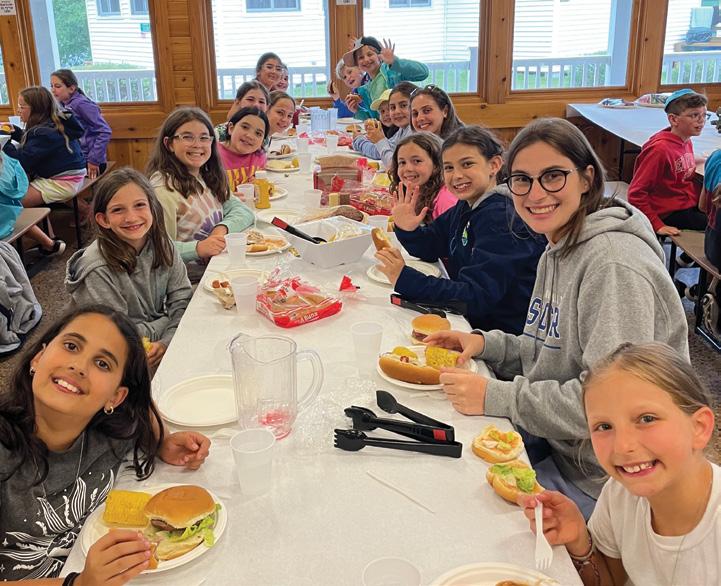

We hope that the following camper readiness milestones, and general camp information, will help your child better understand the structure of the camp day and practice skills to prepare for a successful summer.
• Problem Solving and Independence: Overnight camp provides a developmental opportunity to promote independence and problem-solving skills. You can begin fostering these skills by looking for increased opportunities for your child to practice independence leading up to camp.
• Help create systems for keeping track of belongings and develop a plan for finding lost items.
• Encourage your child to look for missing items (sweatshirt, book etc.) themselves rather than finding it for them.
• Prompt your child to create a process, rather than offering them a solution.
• Encourage your child to exert independence across different areas (i.e. preparing snacks, organizing school belongings, taking care of a pet, making age appropriate decisions.)
• Executive Functioning Skills: Camp involves a variety of executive functioning skills. Here are a few you can work on before your child arrives at camp:
• Practice completing tasks from start to finish and avoid distraction (i.e. daily care, upkeep of space, tracking belongings.)
• Practice mental flexibility regarding the ability to handle a changed schedule, not getting your way or participating in an activity, even when it’s not your favorite.
• Assign small, daily chores for your child to help them prepare for daily clean-up. Tasks can include: making bed, changing sheets, picking up personal belongings, setting the table, hanging up wet towels, and taking out the garbage.
• Communal Living and Shared Space: In preparation for the summer, you can help your child understand what it means to share space with others and the importance of compromising. Feel free to use examples from your own family and consider the following questions.
• What might they enjoy? What might be new? What might bother them? What is their role in making the experience enjoyable for others? What behaviors should they engage in to be respectful of others?
• Help your child identify an independent, quiet activity (reading, puzzles, drawing etc.) to do during down time or when they need a moment away.
• Practice social interactions with other children and process these experiences together.
• Help your child practice self-advocating for their needs. Remind them that they can always ask for help anytime they need assistance. Consider discussing the following questions: Who do they go to at school if they’re not getting what they need? Who are the people other than their teachers they might talk to? How might that play out at camp?
• A Day at Overnight Camp
A day at overnight camp is longer than a day at day camp or school. At 4pm, campers still have afternoon activities, shower time, dinner and evening activity. You can help your child understand that they might be tired the first few days but will adjust to this schedule. Consider what specific elements your child needs to practice to manage a longer day.
• Personal Care: Hygiene and personal care can be challenging for children away from home and their parents. It may be helpful for your child to practice an independent daily self-care routine that they can continue at camp.
• Brush teeth twice daily
• Brush/comb/style hair
• Shower daily
• Clip nails
• Apply sunscreen
• Thorough, frequent and routine handwashing (for at least 30 seconds!)

• Laundry and Clothing: Organizing, tracking and caring for clothing can be a challenge for campers. The following information may be helpful for your child to understand the expectations and prepare for the summer.
• Practice placing dirty laundry in a drawstring laundry bag. You can try hanging it on a doorknob as the bag will likely be placed on their bunk bed in a similar way.
• Practice folding and putting away laundry, and sorting clothing into separate piles so they can find their shirts, pants, etc. on different shelves in their cubbies.
• Discuss the following questions with your child: What clothing items can you wear multiple times before washing (sweatshirts, bathing suits, etc.) and what needs to go in the laundry immediately (underwear, socks, etc.)? What do you do with clothing that you can wear multiple times (put it back on your shelf, etc.)?
• Morning Routine: Each morning, counselors wake up campers in a gentle way. At this time, they are expected to get out of bed, wash up/brush teeth, put away pajamas (either in laundry or in a place to wear again) and get themselves dressed. If your child struggles to wake up in the morning, practice what morning wake up will consist of at camp.
• Nighttime Routine: After evening activity, campers return to the bunk to wash up/brush teeth and get into bed. At camp we have a night time ritual that helps campers to wind down and prepare for bed. It might include counselors reading a story, singing a song, inviting in a special guest, or saying the shemah together. Afterwards, campers may have a few minutes of quiet flashlight time to read or talk together. A bathroom/ closet light is left on and there may be light noise while campers wind down for the night. If your child has trouble falling asleep, help them identify and practice some useful strategies.
• Technology Detox: The following information may be helpful in setting up successful expectations for technology use over the summer, where screen time use is significantly different at camp than at home.
• Explain to your child that no personal screens/devices are allowed at camp, aside from screenless MP3 players, (our campers tell us how much they value this screen break!) and help them understand what this means for them.
• In the weeks leading up to camp, decrease screen time in order to prepare for a screen free summer.
• If your child decides to bring a screenless MP3 player to camp, ensure that they practice using this at home.
• Eating Meals at Camp: Meals are eaten by bunk and are shared together as a community. You can help your child understand what it means to eat together with other children (similar to a larger family) and how to exhibit appropriate and respectful table manners. A variety of foods are served at each meal. You can help your child practice eating what is served at each meal AND remind them that they should always ask for help if they are having trouble finding something to eat. They can also practice setting and clearing the table and making themselves a sandwich.
• T’fillot (prayer services): T’fillot are a part of our daily community culture that take place in a variety of settings and formats, and are designed to engage and teach campers at any level of experience. Campers should come to camp understanding this component of our program and recognize that participation is always encouraged, regardless of level of familiarity. Campers should know that there may be moments where they do not feel like actively participating AND are still expected to be respectful and remain together with their peers.

As a complement to the Camper Readiness resource on the previous pages, this guide is designed for parents/ caregivers to assist in preparing themselves for a successful summer experience. As much as camp benefits the children who experience it, it also benefits the adults who make the decision to send their children to camp.
Camp Ramah in Wisconsin will provide these opportunities for your child:
• Learning important emotional lessons by being a part of a vibrant community. Camp will help your child broaden their perspective by being pushed out of their comfort zone in healthy and safe ways.
• Participating in communal living, where campers benefit from working together toward common goals and learning how to share space with others.
• Learning to navigate peer relationships, respect personal differences and increase social skills.
• Learning to find and use their voices by advocating for their wants and needs. With camp’s guidance, your child will learn who is available to help them and will be encouraged to reach out to adults or peers to ask for help should they need it.
• Building confidence, self-esteem, and resilience by learning to try (and try again!) with choices they navigate themselves. Mistakes and challenges are where growth and a sense of purpose happen. The ability to try new things, fail, and learn to overcome challenges is central to the camp experience.
• Trying out different versions of themselves, free of many of the worries that correspond with the school year.
• Taking risks, conquering fears, experiencing nature, and unplugging from technology.
• Exploring elements of choice, particularly the activities they choose to do throughout the day. The more children make small decisions for themselves, the more they build confidence in their own ability to be independent.
• Taking part in a unique community that creates opportunities for leadership and character building, and the ability to be cooperative, participatory, engaged, and caring citizens of our world.
When your child is at Camp Ramah in Wisconsin, please know that…
• Your child is in a safe, healthy and comfortable environment. Camp staff are trained to take care of your child, in alignment with the values and philosophy of camp.
• Your child will be encouraged to do things on their own.
• You (the parent/caregiver) may feel “kid sick” because you miss your child very much. Your normal routine as a primary caregiver will be different. Just as your camper is learning to unplug (which bolsters their in-person connectivity and creativity!), you may need to adjust as well.
You may be pushed outside your comfort zone:
• You may receive an upsetting letter because, even at camp, sometimes kids get sad. Letters are written at a quiet moment in a busy day and likely reflect your child wanting to share their feelings with you because you are their “person.”
• You might see pictures of your child that generate more questions than they answer. Pictures may show your child with friends you don’t know or may not show your child at all! Pictures are a single moment in time and are not a complete reflection of a camper’s day, let alone their camp experience. You might be more disconnected from your child than you’re used to, but please remember that you are giving your child a wonderful gift. You can always call camp if you have a concern or a question. Please understand that your child could have a hard day, and that the camp staff will help them through it, and they’ll have the opportunity to grow from the experience
• Please realize that you won’t get to know everything happening at camp in real time, but you will see the joy on your child’s face and hear your child tell you all about their experiences when they return home.
We appreciate your decision to send your child to Camp Ramah in Wisconsin and to give them the opportunity to experience overnight camp. As camp professionals, we strive to give children the tools they need to go out into the world and discover who they are and what they want to become. Sending your child to Camp Ramah in Wisconsin is one of the most meaningful, lasting and impactful gifts you can give your child. We look forward to partnering with you for a successful summer.
Ramah has so many strengths, it’s a challenge to choose only a few. Each summer my son returns home with more confidence, deeper friendships, and a renewed sense of Jewish identity and connection.
My campers’ sense of who they are in a broader community, their network of friends, their self-confidence when they go out in the world is rooted in what they experience at camp.
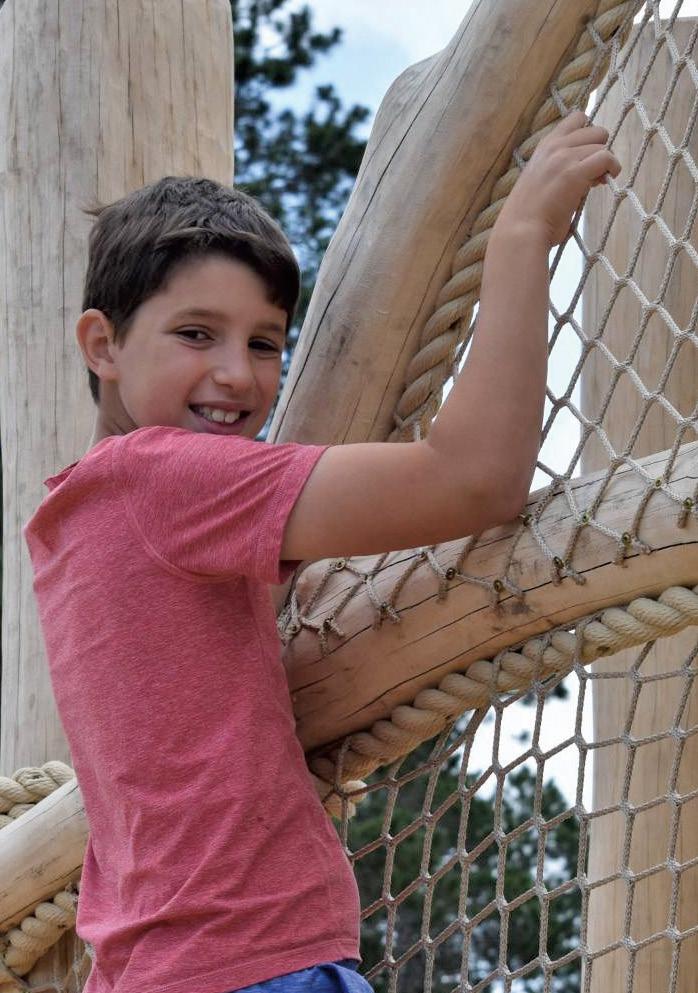
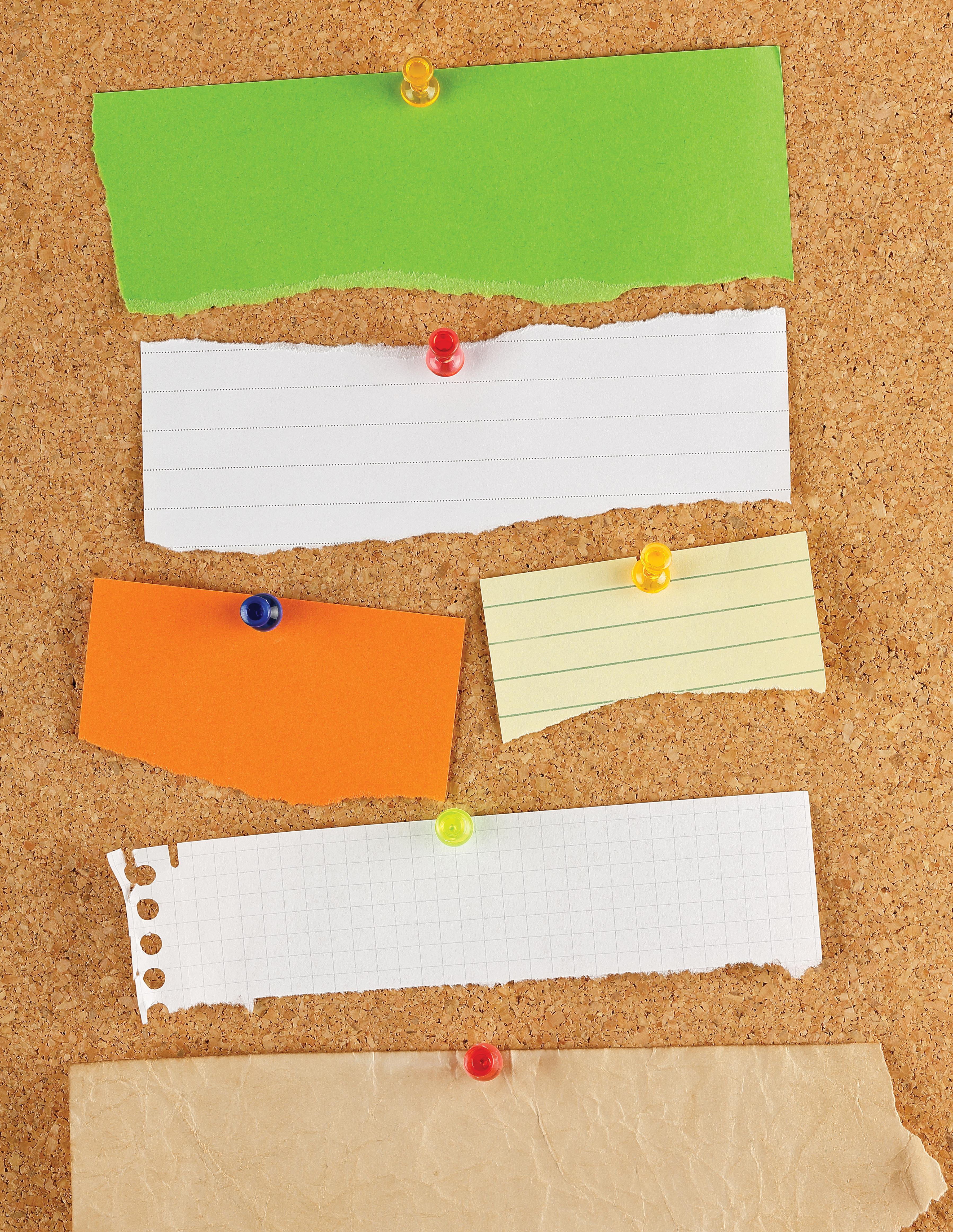
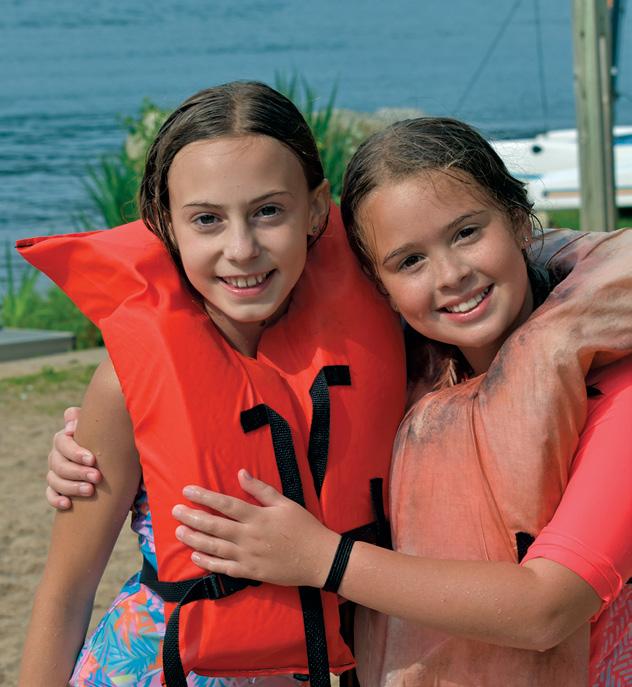
Camp Ramah is truly my daughter’s utopian summer space and she is incredibly excited to go back.
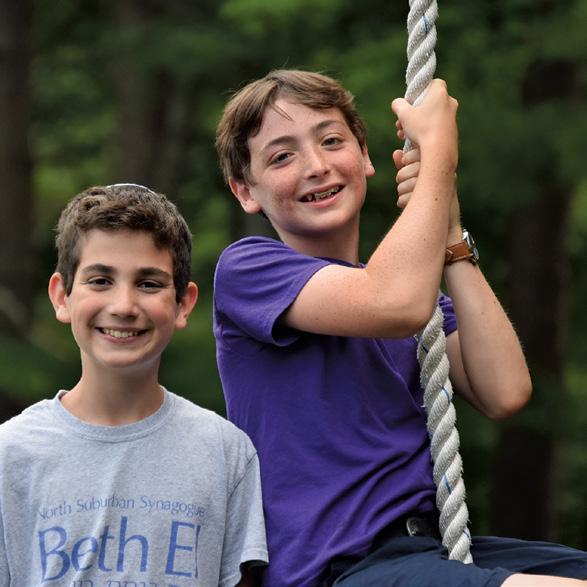
My son came home singing in Hebrew and telling great stories from the summer. He wanted to talk to kids from other cities immediately upon returning home and just agreed to read Torah at services. Mic drop!
Camp Ramah gives our kids a place to engage with Jewish life among friends and away from screens and distractions. They come home singing, creatively free, full of ultimate Frisbee and stories of adventures.
*sung at campwide events*
Bein reechsay he-hareem peneenat teefarah yeeshkon lo badad machaneinu ramah
Bi-masoret avot uv-rove anagim yefaleis lanu derech bee-schach ha-chayim
Le-vaveinu malei rachashei hodaya
od tiheeyeh li-mofeit li-alfei revavah
Nestled among the hills, a scenic jewel stands above all — our Camp Ramah.
In the tradition of our ancestors and with great joy, Camp Ramah shows us the path through the challenges of life.
Our hearts are filled with gratitude. May Camp Ramah continue to be a beacon for generations to come!
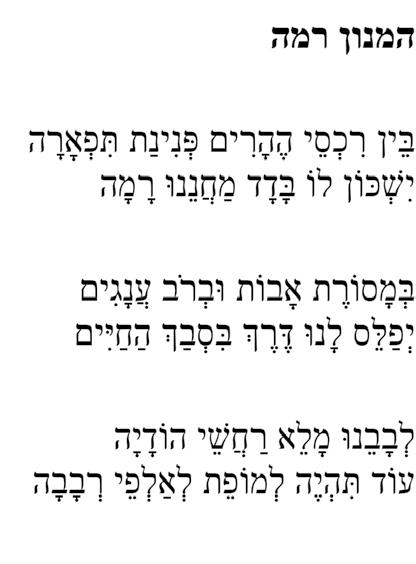
Scan the code to hear Himnon Ramah, our camp song!
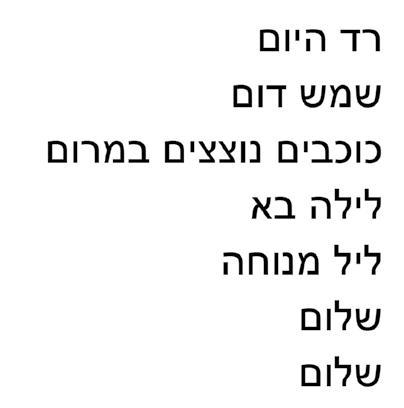
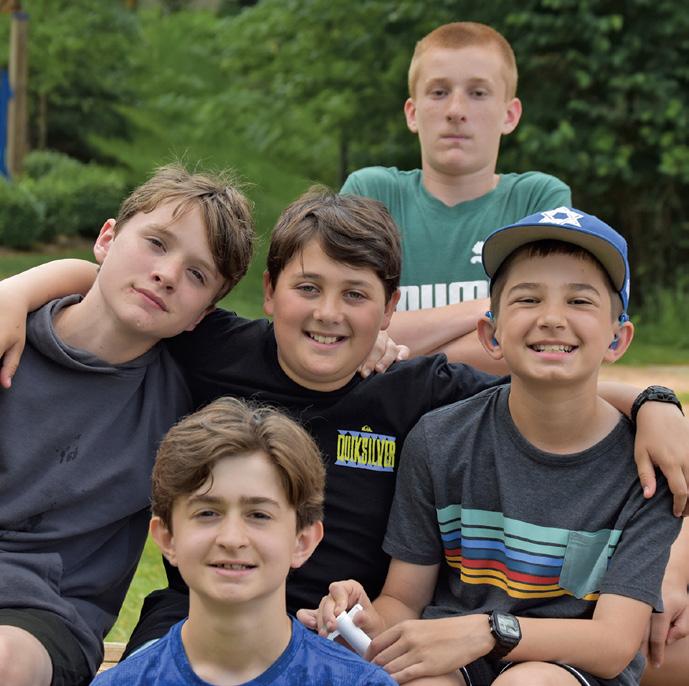
Rad HaYom
Shemesh Dom
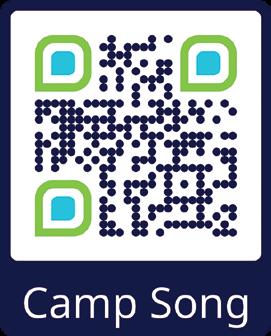
*sung at the end of the day*
Cochavim Notzitzim BaMarom
Lilah Ba
Leil M’nuchah
Shalom
Shalom
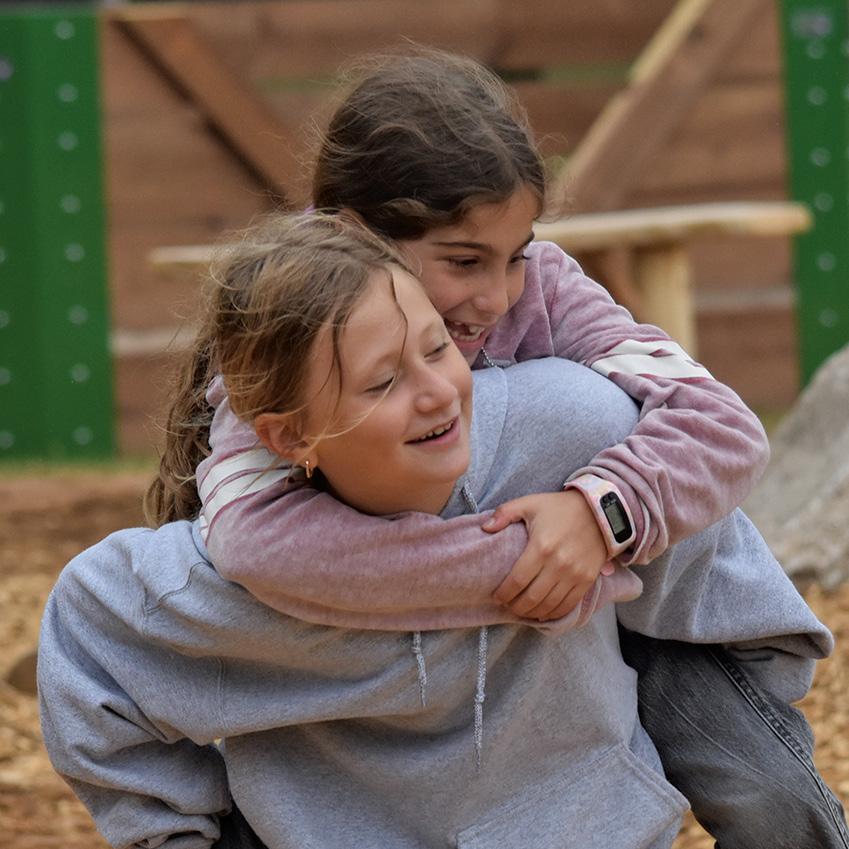
Day is done; gone the sun; stars shine above. Have a good and restful night; Shalom.
םגא Agam – lake
םיאמצע Atzmayim – Tikvah vocational program
םינב Banim – boys
תונב Banot – girls
ןוזמה תכרב
Birkat Hamazon – the prayer after a meal
איצומה תכרב Birkat Hamotzi – the prayer for bread before a meal
םירגוב Bogrim – eidah name for 9th graders
לכוא רדח Chadar Ochel – dining hall
הדע Eidah – a division in camp divided up according to grade
םיניערג Garinim – eidah name for 4th and 5th graders
םיצולח

Halutzim – eidah name for 6th graders
רככ Kikar – central grassy area
ןוכמ
Machon – eidah name for 10th graders
האפרמ Mirpa’ah – (known as the “Marp”) – infirmary or health center
תספרמ Mirpeset – porch or patio area
הנחמה יוקינ
םינובנ
ברע תלועפ
תולועפ
Nikui HaMachaneh – camp clean up
Nivonim – eidah name for 11th graders
Pe’ulat Erev – evening activity
Pe’ulot – activities
הדע שאר Rosh Eidah – a division head
חור Ruach – spirit
הייחש Schiyah – swimming
בוליש
Shiluv – inclusion
םיפאוש Shoafim – eidah name for 8th graders
םיללוס
Sollelim – eidah name for 7th graders
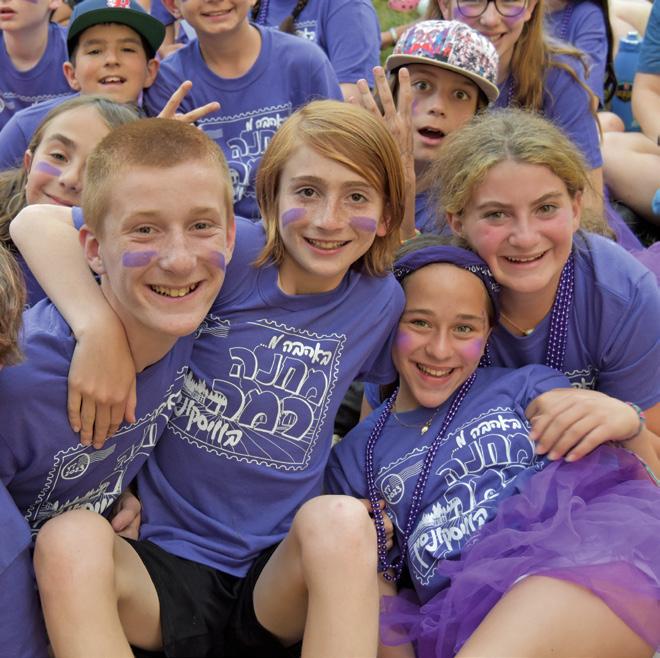
תוליפת Tefillot – morning, afternoon or evening prayers
תווצ Tzevet – staff
ףירצ
ןושי
Tzrif – cabin
Yishun – story in cabin before bedtime
Did you notice that each eidah name is in a different color? That’s your eidah color! Be sure to bring some clothes and/or accessories in that color for spirit days throughout the summer.
